

Keeping Up With Dave!

MY FEAR OF GROWING UP, MATURITY AND RESPONSIBILITY: AN ESSAY KIND OF RANT
A series of uncoordinated thoughts and unrelated pictures to give this letter life..

The thing with being self-aware is you realize how much you don’t know yourself – every single day.
I think it’s because we are constantly changing, and our conscious mind is too slow to keep up with the changes that we’re making, or maybe it’s too tired, or too bored.
I'm scared of growing up.
I'm scared that if I grow up and change into a person capable of achieving all I need to achieve, people won’t accept me anymore.
This fear is exacerbated by the fact that it feels like people aren’t accepting me now.
I’m also scared of growing up because I fear it will make me “not fun anymore.”
I want to be fun.
I remember that I’ve always had the childhood fear of being rejected. This is apparently a common fear, but every person – you and I – experiences it differently.
I thought I had gotten over this fear, but apparently, I haven’t.
The question is why am I scared of being rejected. I already know that not everybody will like me.
Intrinsically, I think it comes down to the fact that I want the people I like, admire and accept to like, admire and accept me too.
I don’t know if that makes sense.
My Childhood

I was not a popular kid. I don’t think I was. I differentiated myself a lot, and I was never concerned with the idea of trying to fit in.
I wasn’t made into an outcast though, in fact when people got to know me they found me amusing and interesting. I was easy to talk to, and in my own way, very funny.
I used to like that about myself. Now, it feels like that person is far away from the person I am now.
So, I guess in a way, I want to get back to being that person.
On Being Smart

I want to get back to being that Dave who is weird and fun and surprisingly very smart.
I say “surprisingly” because I always did my best to not appear smart as my first impression.
That’s not how it is anymore, intelligence cannot be toned down forever,
But I'm thinking now and I want you to engage in this thought process with me;
Do you realize how people don’t like other people who act ‘smart?’
It’s not that they don’t admire intelligence; they just don’t want to be reminded of their own lack.
This sentence isn’t enough to walk you through my thought process, allow me break it down a little further.
You probably don’t like people who act like they know everything.
That’s because those people are usually proud, pompous, always in their heads and never concerned with the feelings of others.
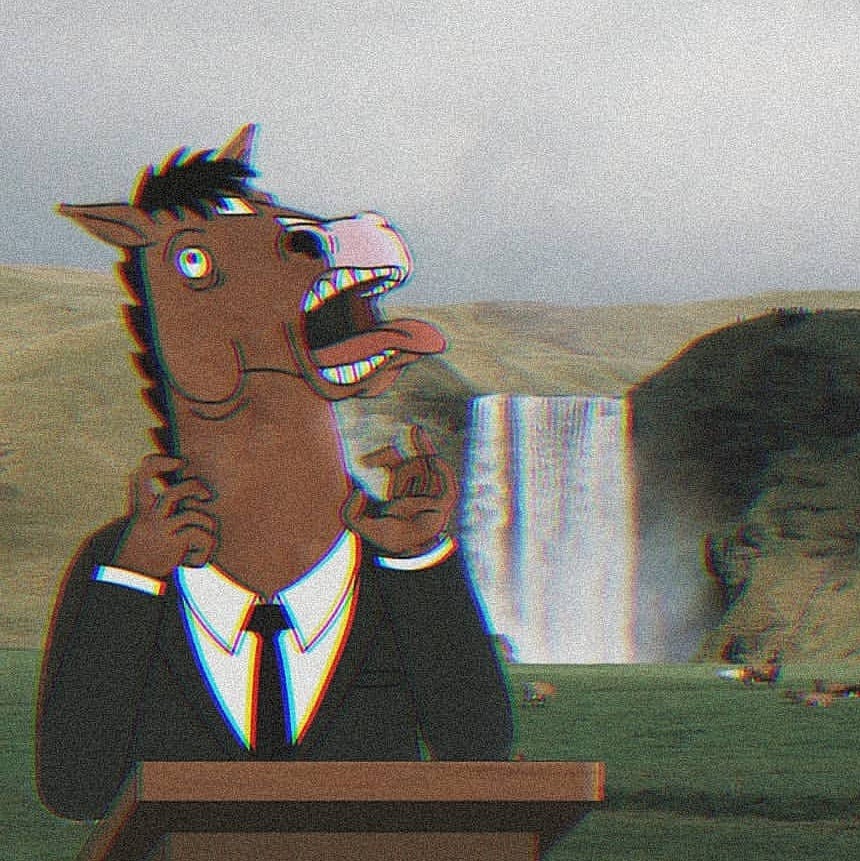
But it may even be more than that,
Why is it that most of the time, it is the smart kids who are the ones always bullied, left out and turned into outcasts?
Most of these intelligent kids were just trying to socialize by talking about the things they loved and were genuinely interested in – values we want everyone to have.
Yet they were mocked and rejected for it.
But here is where it even gets deeper:
When other kids see that intelligent kids are being bullied and cast out for being so smart, their thought process goes
Well I shouldn’t be smart either so that I'm not thrown out from the group and left alone. I don’t want to be lonely.
This is the way most people go on living their lives and hiding their full potential just so they can fit in.
They don’t try hard at the things they care about, some don’t even try at all – they do anything to remain a part of the group.
This brings me to this point:
Humans Are Social Animals.
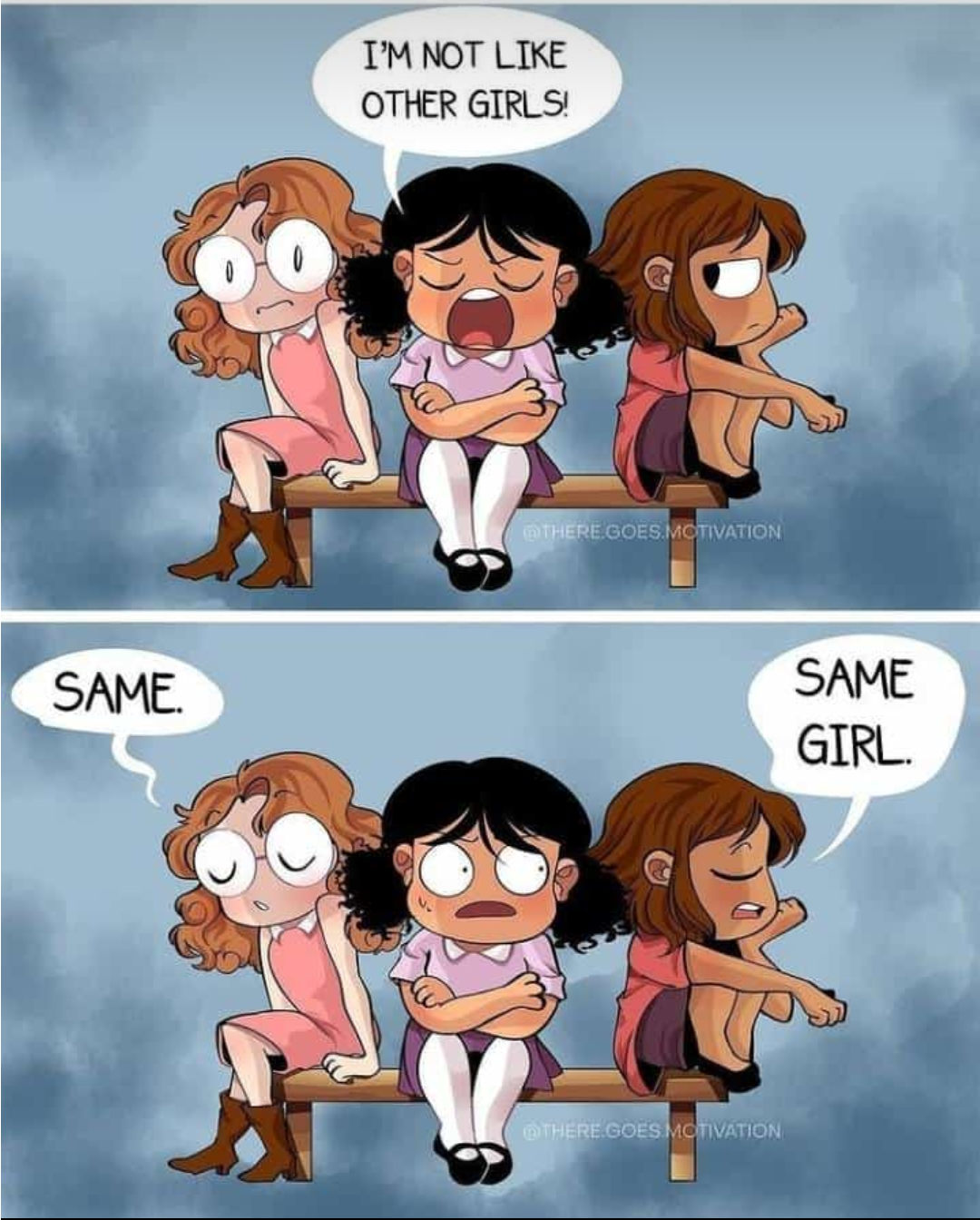
You and I are social animals.
We need community to survive.
We need people to survive.
And while this doesn’t mean the same thing to everybody, we should accept that at our core, we need the presence of other human beings in order to thrive.
This is why in a way society is important.
People validate us when we can’t validate ourselves.
People accept us when we can't accept ourselves.
People see us.
They understand and love us.
They take us in for who we are, no matter how ugly, and we are happier because of it.
And that’s because we know they can be ugly too.
I think my fear of growing up and being rejected actually makes sense.
Because when you think about growing up, this is the thought process you get into (or at least I got into):
If I became a person who got what they wanted to get in a world where most people talk about their dreams and never put in the work to achieve them, would I be ostracized?
Would I be made into an outcast?
Would people think of me like they think of the heroes, the billionaires and role models we look up to on TV, but in reality never want to hang around?
Would they think of me as intimidating? Someone to stay away from before he gets angry at you for not doing the thing you know you should be doing.
I don’t know.
Maybe, I will.
Maybe I will find a new set of people.
But what if these ones don’t want me either?
These Fears Are Useless

A close friend once told me that if I continued to focus on how people are/would reject me, then I’ll get into a mental space where I exclude myself from groups and friendships, and then blame it on people for rejecting me.
She had a point.
Adulthood & Maturity
Adults aren’t fun people.
At least most of them aren’t.
And how can they be?
They’re consistently burdened with the responsibility of their selves, their loved ones, their jobs and what other personal obligation they work to fulfill.
It’s really hard to see these people happy.

Or maybe, they define happiness differently from the way we did when we were kids.
I don’t know. It’s just a thought.
As a child you love your free time, games, friends, parties.
You become teenagers/young adults and you still love the same thing, but now you can add sex, drugs and alcohol into the mix.
The difference between childhood and maturity is responsibility .
And my god is responsibility scary.
Because it means we will change into people who aren’t fun.
And what are we scared of the most intrinsically?
Not being fun.
Self-sabotage behavior stops us from growing up.
Self-sabotage is when we destroy the effort we put into achieving something with our own hands.
You can see it in relationships, friendships and money.

Think of a girl who finally gets into the relationship she’s always wanted acting in irrational ways that gets her kicked out of her relationship.
Or a gambling man betting all the money he just won – as high as millions of dollars – knowing subconsciously that he will lose it, and still never stops being a gambler.
Self-sabotage behavior is tied to things unconscious negative associations you may have.
What do I mean?
If you grow up thinking that all rich people are assholes and bad people, then you will always sabotage yourself when you have the opportunity to make big money because you have associated rich people with being bad people.
And you’ve resolved in your mind that you don’t want to be a bad person.
Another example could be if you were constantly excluded as a child, you would begin to think people hate you or come to you only when they want something.
This means that when someone wants to genuinely be your friend you won’t let them because you’ve made the negative association that people are your friends only when they want something.
And when somehow, by some miracle, someone stays to actually be your friend, you project your negative emotions unto them and soon they leave.
You prove yourself right, by acting in ways that make sure that you are right.
It’s a vicious cycle, difficult to break.
Re-defining Happiness

My point being, at my core, I associate adulthood and taking responsibility as a thing that’s not fun and that does not make you happy.
And guess what?
I want to be fucking happy man.
I want to be happy all day, every day, or at least, on most days.
And the thing is I find happiness in people. I find it in their laughter, in their love, in their solidarity.
If I'm going to be rejected by people, then I'm not going to be happy…
And if I'm not going to be happy, then I don’t want to fucking grow up.
I don’t care about carrying the responsibility of the world on my shoulders.
The world can burn for all I care, as long as I am happy.
This brings me to another thought.
Does this mean I have to re-define happiness?

When the people I love and care about are happy, I'm happy.
And when they’re not, I'm not.
That’s how it is most of the time.
And I'm sure, in a weird cycle kind of way, when I’m happy, they’re happy too.
So I suppose what I should be thinking of is making myself happy so that they, too, can be happy.
I know that I'm my best self when I'm happy and in a good mood.
This means that if I'm intrinsically happy, I can find ways to make them happy without losing my sense of self.
I can get them to open up to me, to talk to me.
Ideally, it sounds legit.
In the end the question I still have to answer is what do I want for myself?
Figuring Life Out

Recently a cute girl with full lips made a statement in a judgmental kind of tone, she said, I already have my life figured out.
She made this claim because of my consistency in putting out these letters and my lack of fear on what I’ll do when I graduate.
It irked me a little bit, but I don’t blame her.
She, like I am, is scared of being an adult too.
She’s scared of carrying responsibility.
Hell, we all are.
Why do you think unhappy people are the ones with unplanned pregnancies and forced marriages?
They haven’t fully learned how to take care of themselves and now you're forcing them to take care of another human being?!
Don’t be ridiculous!
Anyway, that’s a story for another day.
My point is, young lady, if somehow you’re reading this, I haven’t had my life figured out yet.
I don’t know what I want from life yet.
I don’t know what I want for myself yet.
And when I figure that out, then maybe, just maybe, you can say that I have my life figured out.
I doubt it though; I’ve read a lot of things those successful people say.
And the most recurring thing they always confess is they’re trying to figure things out, every single day.
Maybe because they, too, are self-aware that they’re constantly changing, and their conscious mind is too slow to keep up with the changes that they’re making, or too tired, or too bored.
I don’t know yet,
What I do know is I’ll talk to you next week,
But until then,
P.S: if you liked this letter, please subscribe
Want to reach out to me? Hit the button below.
| Liked by Dave
|
Ready for more?
- Bipolar Disorder
- Therapy Center
- When To See a Therapist
- Types of Therapy
- Best Online Therapy
- Best Couples Therapy
- Best Family Therapy
- Managing Stress
- Sleep and Dreaming
- Understanding Emotions
- Self-Improvement
- Healthy Relationships
- Student Resources
- Personality Types
- Guided Meditations
- Verywell Mind Insights
- 2024 Verywell Mind 25
- Mental Health in the Classroom
- Editorial Process
- Meet Our Review Board
- Crisis Support
I Don't Want to Grow Up: What Should I Do About That?
Ariane Resnick, CNC is a mental health writer, certified nutritionist, and wellness author who advocates for accessibility and inclusivity.
:max_bytes(150000):strip_icc():format(webp)/pinkhair-809ed47ad1e844c5b9d25667f1095e62.jpg)
Dr. Sabrina Romanoff, PsyD, is a licensed clinical psychologist and a professor at Yeshiva University’s clinical psychology doctoral program.
:max_bytes(150000):strip_icc():format(webp)/SabrinaRomanoffPhoto2-7320d6c6ffcc48ba87e1bad8cae3f79b.jpg)
PhotoAlto / Frederic Cirou / Getty Images
- Explanations
When to Be Concerned
How to get help.
If you've ever thought to yourself, "I don't want to grow up," then you're not alone. Let's face it: being an adult can feel like a bit of a disappointment compared to what we pictured the future would be like when we were kids. The burden of adult responsibilities and the restrictions imposed by our realities can make being a grown-up downright unappealing compared to the freedom we imagined we'd have.
Back when we had bedtimes, couldn't choose our clothes, and had our meals decided for us by our parents or caregivers, many of us thought that one day, when we were grown up, everything would be better. We imagined a world where we could eat whatever we wanted, stay up all night playing video games, and watch endless television.
What we didn't picture was getting tired in the middle of the afternoon, being bogged down with responsibilities, and having to eat our veggies to keep our bodies healthy. In addition to these daily inconveniences, it doesn't help that reaching many of the milestones of adulthood is more challenging than ever before. For example, buying a house is much more difficult today than it was for previous generations—especially without help from parents.
At a Glance
If you think growing up sounds like a lousy thing to do, you're far from alone. However, just because many people feel this way doesn't mean it's conducive to a good or functional life. Ahead, we'll examine why a person might feel like they don't want to grow up, then look at some solutions to make being a mature adult a little bit easier.
Reasons Someone Might Not Want to Grow Up
There's no one main reason that any person feels like they don't want to grow up, but there are some commons ones. These are a few examples of why someone may be hesitant to grow up.
A Lack of Good Adult Role Models
Not having solid role models can negatively affect adolescent behavior. By the same token, having good role models can have a positive impact on youth behavior.
If you don't have the opportunity to witness how wonderful life as an adult can be, and you see only negative examples of adulthood, it's understandable that you don't feel great about the idea of growing up.
And while you might not have realized when you were young that you didn't have solid role models, it still may have affected your view of adulthood in important ways.
Adulting Isn't Always Fun
Even if you have a career you love and are passionate about, work can be challenging—and sometimes it just doesn't feel fun. It can also not feel fun to have to schedule your own appointments, to go to the dentist, to work through therapy , or to be a parent yourself and have to take care of others.
The fact that being a grown-up isn't always the great time we all hoped it would be can make a person feel like they just don't want any part in it. This may seem a little silly to those adults who are very responsible and love it, but it's a valid feeling.
We're programmed to seek new experiences, which in turn makes us happier as people —and being an adult, performing the same duties day in and day out can feel pretty repetitive and mundane.
Being Alone Is Scary
As a child, you're rarely by yourself. Parents or caregivers are who you start and end your day in the company of, and in between that you spend your time in school, which is full of peers and teachers.
As an adult, though, you may find yourself completely solitary, especially if you live alone and don't have a social job that involves working much with other people.
Being alone can feel scary, and it can make a person want to revert to younger days, when they were around friends more. It can also be much more challenging to make friends as an adult, or to find other people who also take part in hobbies you enjoy .
Childhood Trauma
Dealing with abuse, neglect, or other childhood trauma can age you before your time. You might not have had good adult role models, but even if you did, trauma can make growing up feel particularly unappealing.
Undergoing childhood trauma at the hands of adults can lead to confusion about the roles adults have in the lives of children, too. Also, children who experience trauma often feel like adults before they're of legal age, so it makes sense they aren't looking forward to adulthood when they do technically get there.
Aging Is Considered Unattractive
Our society is incredibly youth-focused. Twenty-something actors are often cast as parents to teenagers, who are themselves also twenty-something actors.
News outlets share photos of celebrities getting older in a way that age shames them, as if it was a crime to age.
We talk about people being "over the hill" and "put out to pasture" as if older folks have less value than young ones. Who wants to move from a young person to an older one, knowing that? It makes sense that the ageism in our society leads people to not want to grow up.
Fear of Death
A fear of death is called thanatophobia . While it's perfectly normal to have some fear of death or dying, getting preoccupied with the idea can lead you to worry about getting older or growing up.
Everyone will eventually die, but that fact shouldn't affect your life. After all, you're alive right now!
The more you fixate on being afraid to die, the more it might be intimidating to grow up. Growing up is synonymous with getting older, which bring you closer to the eventual inevitability of death.
What to Do When You Don't Want to Grow Up
Now that you understand some of the reasons why a person might not want to grow up, let's look at some action steps that might help give you better feelings about being an adult.
Keep Healthy Elements of Youthfulness
There's no rule book that says you have to give up everything about being young. In fact, members of Gen X, who are in their 40s and 50s now, are notorious for not dressing like adults. Many have tattoos, or colored hair, as well.
You can absolutely continue expressing yourself in the manner that feels best to you, even if you're an adult. Adulthood is about your actions more than it's about your appearance.
So, if your hesitancy of growing up is centered around you not being able to express yourself, you should be aware that as an adult, you get to dictate that yourself—and you can be as youthful as you want to be, while still being responsible and mature.
Focus On the Joyful Parts Of Adulthood
Sure, there are certainly difficult parts of growing up, but there are some pretty amazing ones, too. Getting to stay up late talking with a friend, spontaneously going out for ice cream, or taking yourself out to see live music are just a few examples of things adults can do on their own that kids cannot.
By focusing on the positive parts of adulthood rather than just the negative ones, you can reframe your attitude . And once you do, growing up might not seem all that bad after all!
Attitudes are known for shaping behavior, which means that by choosing to enjoy the happy parts of adulthood, you can bring yourself to take part in even more of them.
Discover the Beauty of Personal Growth
It may feel safe to be a child, but there is so much to be said for how proud you can feel when you experience self-growth.
The quest to be a better person is an unending one, and it can bring you joy. It can also be incredibly rewarding, because by growing as a person yourself, you can also improve the lives of others.
You can choose to grow in ways that directly affect other people, such as choosing to embark on an anti-racism journey . Or you can begin a gratitude practice, keeping tabs about what in your life you're grateful for. If you aren't sure where to start, you can look at self-help books to decide what path feels right for you.
Press Play for Mental Strength Tips
Hosted by therapist Amy Morin, LCSW, this episode of The Verywell Mind Podcast shares five mental strength exercises you can do right from your couch (like practicing gratitude). Click below to listen now.
Follow Now : Apple Podcasts / Spotify / Google Podcasts / Amazon Music
Sometimes, the desire to not grow up can also be a sign of a more serious problem. If these feelings are accompanied by other symptoms, for example, it might be a sign of a mental health problem such as depression or anxiety. Signs to look for include:
- Losing interest in things that used to bring you joy
- Not having the energy or motivation to do anything
- Withdrawing from friends and family
- Excess fatigue, changes in appetite, and changes in sleep
- Avoiding people, places, or situations due to feelings of anxiety or fear
If you are experiencing such symptoms, it is important to talk to a doctor or mental health professional about how you are feeling. They can evaluate your symptoms, make a diagnosis, and recommend treatments that can help (which might involve psychotherapy, medication, and/or lifestyle changes).
In some cases, avoiding growing up can take a severe toll on a person's life, relationships, and ability to function. Sometimes referred to as " Peter Pan syndrome ," such tendencies can lead to emotional immaturity and excessive dependence on others.
This can harm relationships and may lead to struggles with substance use and unemployment.
If you are struggling to deal with the expectations and responsibilities of adulthood, there are things you can do to get help. Talking to a mental health professional is a great place to start.
A therapist can work with you to develop coping skills to help you manage the things you find the most stressful about being a grown-up. Instead of avoiding these tasks, you'll be able to tackle them effectively without feeling overly stressed.
Examples of healthy coping strategies that can help you deal with the challenges of being an adult include:
- Leaning on your social support system
- Practicing mindfulness meditation
- Getting regular exercise
- Utilizing good sleep habits
- Journaling to cope with stress
- Using visualization to picture yourself dealing with challenges
- Developing your time management skills to maintain a regular routine and schedule
- Using conflict-resolution tactics to handle difficulties in your relationships
- Maintaining a sense of humor
- Developing a sense of optimism
Establishing a healthy work-life balance can also be beneficial. Managing the stresses of adulthood is that much harder when it feels like your work life is encroaching on your personal life.
Establishing and maintaining boundaries to separate your work and home life can give you the time and space you need to do things that bring you peace and joy.
Keep in Mind
Growing up can be incredibly daunting. Know that you aren't alone in having difficulties on this topic, and that there are many different avenues you can take to get yourself on the path of becoming a happy adult.
Doing things that help you feel young, focusing on the joyful aspects of adulthood, and staying on a path of self-discovery can help make being a grown-up more joyful. If you're still struggling, talk to a mental health professional about things you can do to manage the stresses of adult life.
Joint Center for Housing Studies of Harvard University. How many young homebuyers get support from their parents and how much of a difference does it make? .
Atif H, Peck L, Connolly M, et al. The impact of role models, mentors, and heroes on academic and social outcomes in adolescents . Cureus . 2022;14(7):e27349. doi:10.7759/cureus.27349
Heller AS, Shi TC, Ezie CEC, et al. Association between real-world experiential diversity and positive affect relates to hippocampal-striatal functional connectivity . Nat Neurosci . 2020;23(7):800-804. doi:10.1038/s41593-020-0636-4
Colich NL, Rosen ML, Williams ES, McLaughlin KA. Biological aging in childhood and adolescence following experiences of threat and deprivation: A systematic review and meta-analysis . Psychol Bull . 2020;146(9):721-764. doi:10.1037/bul0000270
Dimitroff LJ, Sliwoski L, O’Brien S, Nichols LW. Change your life through journaling--The benefits of journaling for registered nurses . JNEP . 2016;7(2):p90. doi:10.5430/jnep.v7n2p90
By Ariane Resnick, CNC Ariane Resnick, CNC is a mental health writer, certified nutritionist, and wellness author who advocates for accessibility and inclusivity.
Back to The Library

Yes, Some Teens Have a Fear of Growing Up — Here’s How to Deal
Updated: May 21, 2024
The fear of adulting can have a significant impact on a young person’s life, affecting their relationships, ability to make future decisions, and more. Keep reading to learn how to cope.
By: Britt Brewer
Clinically Reviewed By: Dr. Don Gasparini
Learn more about our Clinical Review Process
Table of Contents
Many young people face challenges transitioning into adulthood. However, hesitance isn’t the only factor hindering personal growth — often, struggling to grow up is a far more complex issue rooted in genuine fear and exacerbated by trauma.
There’s a collective anxiety roiling a generation of young people saddled by student debt, rising housing costs, and an imminent climate crisis . And it’s not just younger generations who’re doubtful about their future — most U.S. citizens agree that young adults are facing an uphill battle as they grow older, data shows . Below, we’ll delve into what causes the intense fear of growing up, if it’s considered a mental health condition, and how to seek treatment for this fear and other phobias.
Join the Charlie Health Library
Get mental health updates, research, insights, and resources directly to your inbox.
Thank you for signing up!
You can unsubscribe anytime., is the fear of growing up a mental health condition.
In short, no. A fear of growing up — also known as "adulting anxiety" or "adult-onset anxiety” — can be characterized by an inability or unwillingness to take on adult responsibilities and a tendency to resist the transition into adulthood. While the fear of adulting is not officially recognized as a diagnosable mental health condition, it can have a significant impact on a person’s life and executive functioning.
Young adults who experience this fear may find it hard to commit to relationships, struggle with financial responsibility, and often view making long-term plans or setting goals as overwhelming. Other common symptoms of the fear of growing up include:
- Feeling overwhelmed by or avoiding adult responsibilities
- Difficulty making decisions related to adulthood
- Physical symptoms like tension, headaches, or stomach issues
- Worrying about finances and debt
- Struggling in relationships due to fear or insecurity
Fear of adulting vs aging phobia
On the other hand, an excessive fear of aging, or growing old, is known as gerascophobia . People who suffer from this mental health condition see the process of aging as a legitimate threat and will go to great lengths to slow down or hide growth. Gerascophobia is marked by symptoms like anxiety or distress related to birthdays, avoidance of discussions related to aging, preoccupation with health, and more. While the causes of the phobia are multifaceted, it can be exacerbated by factors like trauma and sexual abuse.
It should be noted, however, that phobias about entering adulthood and taking on adult responsibilities are in no way symptoms of gerascophobia — a condition concerned with a specific fear around the physical and biological act of aging. Also, it’s unclear if gerascophobia is anecdotally on the rise or just being discussed more in recent years. There’s a possibility people are becoming more aware of gerascophobia due to increased social media and internet usage, which may lead to more people seeking help for their fear.

What causes the fear of growing up?
As mentioned, the fear of growing up can stem from multiple sources, especially in our current day and age. Below are some common causes of the fear of growing up.
Past trauma
Past trauma, such as abuse or neglect during childhood or adolescence, can profoundly influence how someone views adulthood. These experiences may lead to deep-seated fears and insecurities, making it difficult to trust others or feel worthy of happiness. This view can contribute to fears about growing up, as individuals may fear that adulthood will bring more pain or disappointment.
Financial anxiety
The stress and worry about money, debt, and stability can contribute to the fear of growing up, including concerns about basic expenses, future security, and retirement savings. Debt adds to this anxiety, with the fear of paying off loans and interest feeling overwhelming. Job insecurity can worsen these worries, affecting sleep, mood, and overall well-being.
Social media
Social media's detrimental impact on growth and development, especially among kids, teens, and young adults, is well-documented. Many reports link high social media usage to sleep disruption, ADHD, cyberbullying, and increased anxiety . Moreover, social media fosters a "culture of comparison," leading to an obsession with self-image and unrealistic beauty standards, potentially resulting in mental health issues like higher rates of suicide. Recent studies have shown that heavy social media use during early adolescence predicts lower life satisfaction in subsequent years and can even affect brain development. These factors contribute to young people's decreased satisfaction with life and their future outlook.

Every Adult Should Know How Social Media Impacts Youth Mental Health
Dr. Caroline Fenkel, DSW, LCSW
The COVID-19 pandemic
The COVID-19 pandemic exacerbated existing mental health issues among teens and young adults – an age group whose rates of depression and anxiety were already high even before the pandemic, according to a recent Surgeon General’s report . The pandemic’s massive fatality rates, alongside the constant drumbeat of death in the news, ratcheted up pre-existing anxieties, including death anxieties. Also, separation anxiety in kids and young people ballooned when schools reopened and people returned to work. Depression and anxiety can cause people to have a gloomy outlook on the future and inhibit the kind of thought and action necessary for gaining independence and responsibility — two key tenets of emerging adulthood.
Treatment for the fear of adulting
Learning practical skills
Practicing self-care
Treatment for the fear of adulting usually involves therapy and practical strategies to help manage fears and build confidence in handling adult responsibilities. Therapy, like cognitive-behavioral therapy, helps challenge negative thoughts about adulting and develop coping skills. Exposure therapy gradually introduces tasks related to adult responsibilities to build confidence.
Learning practical skills, like breaking tasks into smaller steps and setting realistic goals, can also help manage stress. Encouraging self-care habits like exercise and adequate rest also plays a role.
How Charlie Health can help
If a young person in your life is struggling with the fear of growing up, Charlie Health is here to help. Charlie Health’s virtual Intensive Outpatient Program (IOP) provides more than once-weekly mental health treatment for young people and families dealing with serious mental health conditions, including phobias. Our expert clinicians incorporate evidence-based therapies into individual counseling, family therapy, and group sessions. With this kind of holistic treatment, managing your mental health is possible. Fill out the form below or give us a call to start healing today.
https://www.unc.edu/posts/2023/01/03/study-shows-habitual-checking-of-social-media-may-impact-young-adolescents-brain-development/
https://childmind.org/article/back-to-school-anxiety-during-covid/
https://www.hhs.gov/sites/default/files/surgeon-general-youth-mental-health-advisory.pdf
https://www.refinery29.com/en-gb/what-is-gerascophobia
https://www.ncbi.nlm.nih.gov/pmc/articles/PMC4283456/
https://www.pewresearch.org/short-reads/2022/02/28/most-in-the-u-s-say-young-adults-today-face-more-challenges-than-their-parents-generation-in-some-key-areas/
Comprehensive mental health treatment from home
90% of Charlie Health clients and their families would recommend Charlie Health
More like this

List of Phobias: Common Fears and Symptoms
Britt Brewer
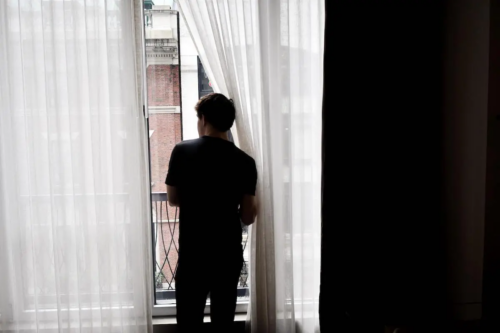
Phobias 101

5 Tips for Getting the Most out of a Teen Intensive Outpatient Program

We're building treatment plans as unique as you.

Get the mental health treatment you deserve
Need additional mental health support? Charlie Health can help. Get started with virtual intensive therapy now.
- Themed Months
- What to Read When
- Beyond the Page
- The First Book
- Funny Women
- Parallel Practice
- Voices on Addiction
- We Are More
- Conversations With Writers Braver Than Me
- All Columns
- Poetry Book Club
- Letters in the Mail (from Authors!)
- Rumpus Store
- The Writer’s Welcome Kit
- Rumpus Shirts & Sweatshirts

- Features & Reviews
- Rumpus Original
What to Read When You’re Afraid of Growing Up
Kendra allen.
- April 5, 2019

Two facts about growing up are forgiving your child self and picking out outfits everyday. I’m good at neither of these things—which is why When You Learn the Alphabet is what it is.
I essentially wrote all of it between the ages of nineteen and twenty-two—years when I had everything to say but knew nothing. I never felt like an adult, I only felt afraid. I describe When You Learn the Alphabet as a bunch of mad stories because once I began taking writing seriously, everything I didn’t realize I was angry about started to reveal itself in abundance. I thought I was simply completing assignments, but, surprisingly, I was crafting an essay collection.
I was (am) in a constant frenzy of having feelings about everything, remembering, unlearning, and reinterpreting. I was (am) looking for any way to express every wrong I felt happened to my bloodline and/or to me, and get it out of my body for good. I’ve failed tremendously along the way, but in taking on this task I learned that sometimes you wrong yourself the most. but the books listed below gave me solace.
Through these writers, I learned how to disguise my anger with sadness, to amplify my anger with politics, to suppress my anger with humor, and to simply experience my anger and live it. I’ve found myself constantly revisiting these books, hoping to cultivate a way to present my thoughts. Some of these books were introduced to me more recently, and others were found through decades of hiding behind books in order to avoid myself. I’ve chosen these books because of how well they get to their roots, and because I could feel the angry child in all of them.
Bone Black: Memories of Girlhood by bell hooks Few things make me happier than books that aren’t afraid to get to the point sooner rather than later, and bell hooks ain’t a beat around the bush kind of writer. This is the book that taught me that telling the truth don’t take that long. I read Bone Black my second year of undergrad and felt an immense jealously that I could never be so plain yet so powerful, especially in memoir. This book is the exact book I dream of writing someday. It changed all of my expectations of what story is, and could be, making me comfortable with simply moving on once I had nothing more to say. There’s not a chapter in Bone Black that is more than three pages. There’s not a chapter in Bone Black that’s not doing tremendous work for black folk and little black girls. There’s not a chapter in Bone Black that doesn’t take the air out of your windpipe.

How to Slowly Kill Yourself and Others in America by Kiese Laymon I didn’t have a favorite book until I read this one. How to Slowly Kill Yourself and Others in America was the first essay collection I read and it changed everything I previously thought about writing essays, and of what “personal essay” even meant. This is one of the most marked-up, most re-read, and most honest books I own. I had never encountered a writer who spoke how I spoke without their language being guarded and redirected, which was a big thing for me. And if we talking ’bout craft, Laymon found a way to make himself a border to protect the content; he found a way to make his content a conversation, and to make the essay cause the reader to question how they subscribe to America’s fabricated narratives. Endless gems. Endless laughs. Endless relatability. This was the first book to make me feel comfortable enough to use my own voice—no matter how grammatically incorrect it is, no matter its interests, no matter how passionate it can get—and to stand up in whatever I wrote on the page.

The Bluest Eye by Toni Morrison I don’t know how I can think about style, or writing, period, without thinking of Toni Morrison and the endless times she’s demonstrated the multitudes of ways to tell a little black girl’s story. The Bluest Eye is the perfect example. Being that it’s Morrison’s debut novel, the way she tackled the hard truths of Pecola’s particular girlhood through the secondary characters not only exemplifies that she’s on an entirely differently level when it comes to skill, but also that she’s on a different level when it comes to evoking a image and a feeling that ties you to every character in this book. It’s a timeless piece of work and a master class on craft and story. I love you, Ms. Morrison. Please marry me.

Flyy Girl by Omar Tyree I’m obsessed with coming-of-age stories no matter what medium they’re presented in. Flyy Girl was one of the first to come into my life. I remember being a child and all of the older, teenaged girls reading it while simultaneously living it. The book’s protagonist Tracy Ellison was the quintessential black girl. She was my best friend. She was my cousin. Some parts of her were even me. I thought Tracy was so fly and so flawed and I saw pieces of her in every girl around me. Omar Tyree made her real and a reflection. He mapped out her mental, physical, sexual, and emotional journey from the ages of six years old through twenty with style, grace, fun, pain, and most importantly, dialogue that felt like home. Every time I revisit Flyy Girl , it’s like I’m catching up to Tracy a little bit more than I previously had.

Loving in the War Years by Cherrie Moraga There are certain songs that have the ability to transport you to a specific time and place. Fortunately, there are books that trigger past lives as well. Loving in the War Years is one of few that do this for me. Words like “wow” cannot do it justice. What a woman. What a talent. The fear in the language, the fearlessness in the language, the loud activism—it’s suffocating and all-consuming. Loving in the War Years is genre-bending, multilayered, multiethnic brilliance. Moraga is doing something I didn’t know was possible: to make one thing everything only for it to be named a collage when in fact it is a life. Easily the most beautiful, infuriating, loving, and loveless book I’ve ever read and I’m so thankful to have found it.

White Girls by Hilton Als This book, although amazing in its entirety, is on this list for one essay alone. The first essay in this collection, “Tristes Tropiques,” is probably the greatest essay I’ve ever read. First, it’s eighty-four pages. I love the balance of seamlessly blending the personal with the cultural. I love all the questions. I love all the lyricism. I damn near am in love with Als himself. If we’ve ever had a conversation about nonfiction, I’ve more than likely mentioned “Tristes Tropiques” and pronounced it incorrectly. Every sentence feels like a privilege to read. Something I love about this essay, and this book for that matter, is I often feel like I’m not smart enough to read Als. Actually, I know I’m not smart enough to read him, but here, every line is doing the work to make me understand him. Just read this: “No one seemed to understand what we were talking about most of the time. There was no context for them to understand us, other than their fear and incomprehension in the presence of two colored men who were together and not lovers, not bums, not mad.” And Als doesn’t stray from providing the context, in a way that feels like a kiss goodbye.

Chasing Destiny by Eric Jerome Dickey I have a deep, deep, love for black ass fiction that doesn’t care about being too black or too niche. Chasing Destiny was one of the books I found on my mama’s bookshelf when I was about twelve. I had no business reading it. It’s too much sex, too much violence, too much trauma, too many drugs, too many mistakes. But I was hooked, because “too much” was just a reality. I read it over and over again. Each time, I could not wait to see what happened to all of the characters. There was not a moment that dragged on too long. It was exciting, and I quickly learned excitement is an imperative element in any reading experience no matter how daring a book’s concept is perceived to be. I’ll never understand why the masses refuse to take these “urban fictions” seriously, and are instead satisfied with being bored to death by books and calling them classics, but I digress.

Frankenstein by Mary Shelley Speaking of classics, if I let my English teacher from twelfth grade tell it, I didn’t know how to read at all until she taught me how to read Frankenstein . This was the first book I had to take line-by-line notes on, and I book I’ll probably never read again because of this. But, in hindsight, I found deeper meaning in a monster; I found that monsters aren’t always the villain; and I found that authorial intention, and watching that vision unfold, can coexist while also being entertaining. I guess I should say thank you to that teacher for helping me search for an author’s intentions just as much as I search for a story’s meaning. Shoutout to Ms. Rob.

The Coldest Winter Ever by Sister Souljah All I’m gonna say is, The Coldest Winter Ever is my classic American novel and we gotta stop disrespecting Sister Souljah’s pen in these streets. The Coldest Winter Ever should never leave the best-seller’s list, if we’re being completely honest. Your favorite author couldn’t even fathom creating a Winter or a Midnight or a Natalie or a Bullet and making them human. Humanity isn’t even a word that would cross their minds. I’m still waiting for it to be adapted into a movie. Please let me cast it, or write it, or just be in the room while it’s made.

Men We Reaped by Jesmyn Ward I lucked out on finding this book because Jesmyn Ward’s reputation precedes her. I’d never read any of her fiction, but during a workshop someone mentioned Men We Reaped and said they’d read it in a day. When I got my hands on a copy, it took me longer than a day to read it, but that’s because I was too in awe of the time, intention, and discipline it must have took to write through this concept and not stray away from it. I was too busy taking in every line, too busy trying to keep these men—these boys—alive as long as I could. I didn’t want any of their stories to end. Out of the thousands of books I’ve read in my lifetime, Men We Reaped was the first book that ever made me cry.

Don’t Let Me Be Lonely by Claudia Rankine With most of Rankine’s work, the general consensus is: What is this? The first time I asked this was when I read Don’t Let Me Be Lonely. There’s pictures. There’s poems that could be essays that could also be stories. It’s unidentifiable, but it’s so striking you can’t help but participate in trying to figure it out. I admire Rankine’s lack of explanation. I’m envious of how freeing that must feel for her as a writer. I want to stop over-explaining, and Don’t Let Me Be Lonely helped to me realize it. Also, I’m not into naming things but I’m obsessed with titles, and Don’t Let Me Be Lonely is pure fire.

The Color Purple by Alice Walker Form can take a book from mediocre to innovative. The Color Purple is everything but mediocre, and Walker’s choice to tell this story through letters only amplifies her genius. I’m intrigued by the different ways we can write a chronological narrative and how to place the reader on a rollercoaster of emotions without exhausting them. When I come across books like The Color Purple , I have to admit that skill this flawless may be something that can’t be taught. Even with all the nuance and difficult content, The Color Purple is an easy and enjoyable read, and if any other writer attempted to do this, the bridge might be impossible to cross. If this book taught me anything, it taught me about the distribution of time and how to delegate it between your characters. And, it taught me to be loud.

Giovanni’s Room by James Baldwin I adore Baldwin in any genre, but my favorite is fiction-writing Baldwin. I was introduced to his words, to his voice, later than any living thing should be. I’d never read someone who wrote exactly how they spoke. The long-winded sentences, the punctuation stacking, the pause that’s so present on and off the page. When I read Giavonni’s Room, I felt heartbroken by everything the book held in its less than two hundred pages. The things Baldwin does with time, with desire, with anger, are unmatched. Everything written feels like an uppercut to the chin. Take this dialogue between David’s parents, for instance:
“…all I want for David is that he grows up to be a man. And when I say a man, Ellen, I don’t mean a Sunday school teacher.” “A man,” said Ellen, shortly, “is not the same thing as a bull. Good-night.”
I mean, there’s really nothing more to say; we’re all just somebody’s child.
And to close out this wonderful list, we just had to include Kendra’s debut essay collection, When You Learn the Alphabet , forthcoming April 15 from University of Iowa Press! – Ed.
When You Learn the Alphabet by Kendra Allen Kendra Allen’s first collection of essays—at its core—is a bunch of mad stories about things she never learned to let go of. Unifying personal narrative and cultural commentary, this collection grapples with the lessons that have been stored between parent and daughter. These parental relationships expose the conditioning that subconsciously informed her ideas on social issues such as colorism, feminism, war-induced PTSD, homophobia, marriage, and “the n-word,” among other things. These dynamics strive for some semblance of accountability, and the essays within this collection are used as displays of deep unlearning and restoring—balancing trauma and humor, poetics and reality, forgiveness and resentment. When You Learn the Alphabet allots space for large moments of tenderness and empathy for all black bodies, but especially all black woman bodies—space for the underrepresented humanity and uncared for pain of black girls, and space to have the opportunity to be listened to in order to evolve past it.

Kendra Infinite Allen is the author of award-winning essay collection When You Learn the Alphabet and poetry collection The Collection Plate . Born and raised in Dallas, TX, she loves laughing and leaving. Her work can be found on and in Repeller, Southwest Review, Frontier, The Rumpus , and more.
You May Also Like

The First Book: Marcela Fuentes
- Marcela Fuentes
- July 10, 2024

There’s Always a Little Light, a Glimmer of Hope: A Conversation with Annell López
- Christine Kandic Torres

The Great Man and The Wife: On Controlling the Narrative in Sarah Manguso’s Liars
- Kate Preziosi
- July 9, 2024

This is a Meditation on Survival: A Conversation with Emily Raboteau
- Linsey Maughan
- July 8, 2024
Input your search keywords and press Enter.

The Rumpus needs your help. Our Summer fundraising goal is to raise $15,000 to DIRECTLY support our 300 2024-25 contributors . Reaching our goal by JULY 12 will allow us to triple our current monthly contributor budget . Can you support us at any level? Every dollar counts and is a sign that collectively we value creative labor and independent publishing.

- Doing Hard Things
- Teens in the News
- Personal Growth
- School & Work
- Media & Entertainment
- God & Church
- Friends & Family
- Dating & Relationships
- Do Hard Things
- This Changes Everything
- Transformed by Truth
- Stand Up, Stand Strong
- The Rebelution
- Editor-in-Chief
- The Founders
- Submit Content
Why “Growing Up” is Scary (And 3 Ways to Battle Adulting Anxiety)

“You’re going to be an adult in less than a year.”
I’ll never forget the day I realized there were only a few months until I would turn eighteen. Only a few months until I would be a legal adult, which meant I needed to start acting like one. I needed to “grow up.”
For some, the idea of “growing up” means freedom–you can do whatever you want, no longer under parental restraints. Personally, however, “growing up” has always caused me anxiety. At any mention of “adulting,” I’d avert my eyes and change the subject.
And I think a lot of teenagers could say the same.
But what makes teenagers fear the future, and what can we do to fight those fears? Well, like Brett and Alex write in Do Hard Things , society often attempts to sell teenagers a series of lies about themselves, lies that lead to this paralyzing fear of “growing up.”
Here’s how three of these lies convince teens that “adulting” can be scary, and three ways to fight those fears.
SOCIETY TEACHES US TO FEAR THE UNKNOWN
The first lie society tells teens is that we should fear the unknown . Psychology Today claims, “Feeling scared of the unexpected [is] normal as adolescence gets underway.”
Notice the word “normal” here–-society expects teens to fear anything uncommon, a viewpoint that completely contradicts the “do hard things” mentality. But if we adolescents barricade ourselves within the realm of “normal,” we won’t make a difference in the world.
So yes, stepping out and doing hard things does require venturing into the unknown. And yes, that can be scary. But that doesn’t mean we need to stop.
2 Timothy 1:7 says, “For God gave us not a spirit of fear but of power and love and self-control.” When the unknown threatens to scare us, this verse is a perfect reminder that we were not created to fear anything –-including the unknown.
SOCIETY TEACHES US TO FEAR RESPONSIBILITY
The second lie society tells teenagers is that we should fear responsibility . Even the thesaurus shuns the idea, with words like “burden,” and “liability” topping the list of synonyms for responsibility.
But is responsibility really so bad? 1 Corinthians 13:11 says, “When I was a child, I spoke like a child … When I became a man, I gave up my childish ways.” While as children we are free to imagine and play, Paul writes that once we “grow up,” we have to start acting like it.
This is where responsibility comes into the picture. But what would happen if you took an “adulting” responsibility like going to work and thought of it as a blessing?
You’re probably thinking, A blessing? How can work be a blessing? But just think–-right now, almost 15% of Americans are out of work. Yet, God has blessed you with the opportunity to serve Him with your talents every day!
So how can we combat the fear of responsibility? Start looking at your responsibilities as blessings, and your fear will melt away.
SOCIETY TEACHES US TO FEAR FREEDOM
Finally, society teaches us freedom is scary. No, you didn’t read that wrong. The same freedom Americans have fought for since the dawn of our nation often scares teenagers.
So why do adolescents find the freedoms of adulthood overwhelming? The Institute for Faith, Work, and Economics answers the question: “We are scared of freedom because the burden is heavy,” an article states. “We do not trust ourselves or others to carry [this burden].”
Even though freedom seems like it should mean we can do whatever we want, “freedom” from other people’s expectations means we have to create our own. Creating our own expectations means responsibility, and as we’ve already seen, responsibility can seem scary.
Considering this, what does the Bible say about responsibility? Well, the apostle Paul writes in Galatians 5:13 that freedom is not a burden, but rather an opportunity to serve. Instead of letting others dictate our behavior, teens should embrace the freedoms of adulthood and use them to spread the love of Christ.
THREE WAYS TO BATTLE ADULTING ANXIETY
So, now that we know why “growing up” often seems scary, what can we do? How can we get excited about maturing in a world that tells us we should do the opposite? Here are three ideas.
1. Prepare for your future
Like I mentioned earlier, the unknown can be scary. That doesn’t have to be a bad thing, but there are ways to limit how much “unknown” you have to deal with. The more familiar you are with the possibilities of your future, the closer you will be to conquering your adulting anxiety. For instance, if your fears are rooted in college, schedule a visit to a few campuses you’re interested in. If you’re scared of driving on your own, set aside time to practice with an instructor.
2. Explore God’s promises about your future
The Bible is called the Sword for a reason–-it’s an excellent tool for fighting against fear! Along with stories about adolescents who grew up to do amazing things (think David, Ruth, and Joseph), the Scriptures are full of encouraging promises about Christian teens’ futures. Some of my favorites are found in Philippians 1:6 and Jeremiah 29:11.
3. Pray about your future
Finally, talk to God about your fears. In Philippians 4:6-7, Paul writes that when we pray, the Lord replaces our fears with “the peace of God, which surpasses all understanding.” I don’t know about you, but I’d rather have peace like that than spend my days in fear!
So why do teenagers fear the future? Adulting anxiety occurs when teens believe the lies the world tells us about our lives and ultimately don’t trust God with our futures.
Knowing this and armed with tools to fight these fears, let’s step out as a generation of teenagers who will, instead of running away, embrace the freedoms, responsibilities, and unknowns that come with adulthood.
About the author
is a freshman at the University of Georgia studying English and Media Studies. When she’s not writing for her blog Anna Kay, Anna Kay . Anna enjoys reading memoirs and historical fiction, traveling, worship nights, and spending time with friends at Athens coffee shops. Anna hopes to someday work in the Christian media industry, hopefully writing/producing movies and social media. You can find Anna online on her blog or on Instagram, at @annakaywrites.
The Rebelutionary Checkup Quiz

Are you thriving as a rebelutionary? Or are you struggling with doing hard things? Take our quick rebelutionary checkup to find out and to get a free customized action plan on how to grow and thrive as a rebelutionary.
Get The Rebelution in Your Inbox!

Want to keep in touch with The Rebelution ? Every week, we send out an email with our weekly content roundup, along with a dose of encouragement for the Rebelutionary.
Add comment
Cancel reply.
This site uses Akismet to reduce spam. Learn how your comment data is processed .

The Psalms: A Book for All Our Days

Write by Faith, Not by Sight: Writing as Practice in Gospel Living

Don’t Waste Your Life

Battling Discontentment: Three Steps for the Fight
The Rebelution is a teenage rebellion against low expectations—a worldwide campaign to reject apathy, embrace responsibility, and do hard things. Learn More →
Things you buy through our links may earn Vox Media a commission
Those Were the Days of Our Lives
This generation will never know the true freedom — and neglect — of being an ’80s kid..
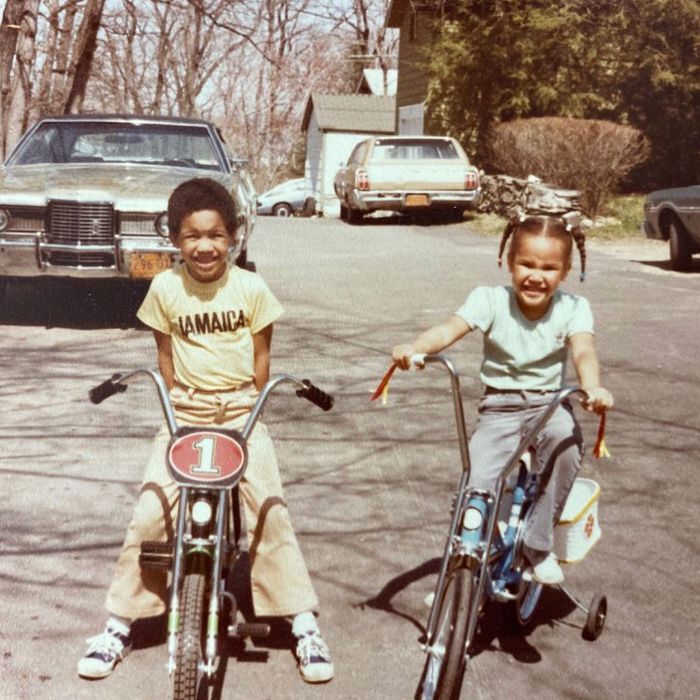
My 7-year-old goddaughter missed her friends a lot over the past year. Like most kids, she spent the pandemic indoors and, as an only child, mostly without the presence of other children. A deeply inventive and wildly creative child, my goddaughter had tons of fun inside, largely due to the fact that her parents have the patience of saints and gave her space to explore her interests, some of which include: experimenting with outfits, making tiny people out of rocks and sticks, doing an intense inventory of the world of Pokémon, participating in her first school play via Zoom after the kids did everything from creating the characters to writing the script, and smearing her face with lipstick while demanding to be told the history of strawberries.
But she still missed her friends. Like the majority of children — and a healthy percentage of adults — I know, for her, Zoom dates quickly turned to tears as she realized it was a withering replacement for the fun and excitement of shouting with your best friend in the same room.
When my goddaughter finally got to see one of her friends in person, her mother — my oldest friend — drew chalk circles in the driveway for them to stand in, far enough apart to avert risk but so painfully close it made each child cry to not be able to hug each other. When she texted me photos of their reunion later that evening, we thought about how our own parents would handle the situation and laughed, deciding that they would have left us outside to fend for ourselves, pandemic be damned — they had a baked ziti in the oven and long, cord-stretched phone calls to make to each other.
The hardest thing to convey to the children in my life about my childhood is the concept of unadulterated freedom. As people who have been scheduled and monitored down to the second for most of their lives, they truly cannot conceive of life outside of the panopticon of their own experience. When I was a child, a successful day was one where I saw my mother for two hours total, split evenly before and after she went to work.
Helicopter parents were born in the 1980s, a direct response to their personal experience of being roundly ignored by their own parents. Children were not to be seen nor heard, and we were definitely not supposed to complain about any injuries sustained during the 15 hours a day we roamed the streets. We saved popsicle sticks from the Fat Frogs, Rocket Pops, and assorted ice cream purchased at the Good Humor truck to fix our sprained and broken digits, taping them to our misshapen fingers and toes with contraband masking tape snuck out of a kitchen drawer while someone’s mom watched Days of Our Lives in the living room. Mosquito bites were relieved by using our fingernail to press a cross shape into the swelling skin, bee stings were only an emergency if they caused our throats to swell so much we could no longer call out “Marco!” or “Polo!,” and the only antiseptic liquid used on cuts and scrapes was our own spit.
The 1980s were a decade of neglect, and I haven’t felt freedom or terror like it since.
As an indoor kid at heart, it took me a while to warm up to being outside all day every summer. I could easily fill an entire day reading library books, creating new outfits for my Barbie out of candy wrappers, or practicing crochet chains with the giant ball of yarn my grandma gave me. Inside was full of wonder, mystery, and the life of the mind. Outside was a hellscape of insects, rusty nails, and scraped knees.
But the outdoors offered something that was hard to find inside the two-bedroom apartment I shared with my mom and brother: freedom. I craved the freedom that came with extended summertime parental neglect. Parents worked all day or had household chores we were never privy to while we were in school. The further out of the way we were, the better. We formed friendships out of necessity, banding together for survival. With my only company being other children, I quickly became accustomed to a more feral way of life.
We learned how to read a clock in school only for it to immediately become completely irrelevant; we rose with the sun, like farmers, and came in for the night when the streetlights turned on. The more ambitious among us laid out their play clothes the night before so they could jump into their outfits like firefighters ready to tackle a blaze. The truly epic slept in their filthy clothes after a night of arguing with their parents about when it was time to come inside in the first place.
Summers in Greenwood Lake were wild. I lived in a part of upstate New York that was more country than suburb, a town with one stoplight and no signs indicating “Children at Play.” Not only did Mom avoid scheduling any day camps or babysitting, but she also had no earthly idea how my brother and I spent our time once she left for work. She once came home to a pile of burnt matches on the doorstep where my brother and his friends used a significant portion of the afternoon trying to light the side yard on fire, and she was only angry that they didn’t clean up after themselves. The one true rule of summertime was that we were not allowed in our own house until she came home.
“Do not run in and out of this house all day with your friends,” Mom said sternly. “I don’t want you in here ruining everything.” It was never clear to me what we might ruin or how we could ruin it since we had to ask her for permission to play with our own toys, but in Mom’s mind, any child left alone in a house for more than three minutes was looking for an excuse to rip couch cushions apart with their bare teeth.
My internal clock was never keener. Without arranging to meet, all the kids in a two-mile radius managed to wander out to the yards and streets of our neighborhoods around the same time each morning like Raisin Bran–fueled zombies. Sometimes you would hear a kid outside playing before anyone else, and that would be the clarion call to the rest of us to hustle. A cacophony of banging screen doors signaled our mass exodus. We were wild. We were free.
Mostly, we were heathens who urinated outside for months.
Staying outside all day meant we had to find ways to be resourceful about the lack of a toilet almost immediately, and the biggest daily grift was trying to weasel your way into a bathroom. Any bathroom. Stay‑at‑home moms everywhere lived by the same credo: No Child Left Inside. Sometimes someone would summon the courage to knock on a door and ask. The mom would answer and narrow her eyes suspiciously. “Number one or number two?” If it was number one, she’d just shake her head. “Outside,” she’d say, pointing into the distance. “Can’t have you kids running in here all day.” If it was number two, she asked the cruelest question of all: “Can’t you just hold it until you go home?” Even if your guts felt like a freshly wrung T‑shirt, you instinctively knew that the answer was yes. It took a real psychopath to ask that question, and a real sociopath to say no.
Wildness can exist indoors, but it’s not as fun. As latchkey kids, my brother and I had to entertain ourselves for hours before my mom got home from work, which generally resulted in some form of shoulder-high mayhem. The crowning example of this would be the creation of Spiderweb City, which we achieved by ransacking Mom’s yarn basket, tying a loose end to a piece of furniture, and running around the room looping the yarn to furniture, shelving, and window latches until the entire space looked like that parkour theft scene from Ocean’s Twelve . Once she was able to slice and hack her way inside, Mom was furious. I spent the cumulative equivalent of entire days pressing my nose into various corners of our apartment as punishment, but I was never grounded for anything I did outside of the house, where, for example, I routinely lit things on fire. Indoor creativity pushes the boundaries of parental patience far quicker than outdoor wildness.
In the past year, as we received the indoor-kid dream directive to stay inside, I’ve never felt lonelier, less focused, or more anxious. I daydreamed about feeling soft grass on my bare feet, walking down the street with another person, or, if I really let myself go, cracking open one more bottle of wine on someone’s porch while the moon clocked in for its regular shift. I’ve started to look back on those childhood summers with more fondness, making promises to my future self that I would recapture those fleeting moments of freedom whenever possible. I haven’t examined it closely, but this is surely part of the reason I recently purchased my first home, a farm, and immediately set up an archery range on the back acre of my property. I want enough space to roam with my friends. I want the night sky. I want to get poison ivy, I want to get sprayed by a skunk, I want a thin film of dirt winding toward the shower drain at the end of a long day of nothing.
I’ve watched enough true-crime documentaries to want to keep my goddaughter heavily chaperoned until she turns 50, but after the year we’ve all had, I hope there’s some room for kids to take a cue from the 1980s and explore this summer. To break free of their chalk circles and find a place in the yard to squat, just out of view, and mark their return to the world.
Excerpt is adapted from Danielle Henderson’s The Ugly Cry: A Memoir
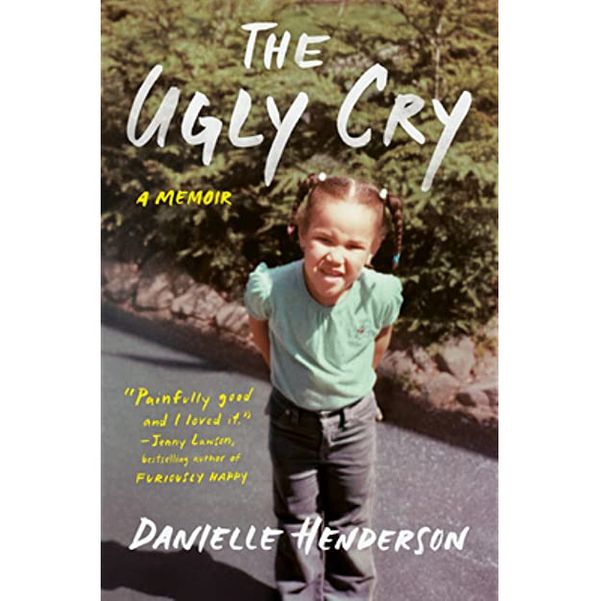
Every product is independently selected by our editors. Things you buy through our links may earn us a commission.
- cut homepage lede
- personal essay
- first person
- book excerpt
- best of the cut
The Cut Shop
Most viewed stories.
- What’s the Deal With ‘Hawk Tuah’ Girl?
- Alice Munro Was Hiding in Plain Sight
- Violet Affleck Reveals She Contracted a Post-Viral Condition
- Why Did These YouTubers Give Away Their Son?
- I Was Diagnosed With Autism in My 40s. It Gave Me a Lot of Answers.
- The Unbranding of Abercrombie
- ‘The Economy Ruined My Relationship’
Editor’s Picks

Most Popular
What is your email.
This email will be used to sign into all New York sites. By submitting your email, you agree to our Terms and Privacy Policy and to receive email correspondence from us.
Sign In To Continue Reading
Create your free account.
Password must be at least 8 characters and contain:
- Lower case letters (a-z)
- Upper case letters (A-Z)
- Numbers (0-9)
- Special Characters (!@#$%^&*)
As part of your account, you’ll receive occasional updates and offers from New York , which you can opt out of anytime.

We shouldn’t worry so much about our kids’ anxiety – it’s a normal part of growing up
Lecturer of Psychology, University of Stirling
Disclosure statement
Line Caes has received funding from the Fund for Scientific Research (Flanders); Louise and Alan Edwards Foundation; Wellcome Trust; International Association for the Study of Pain; Dalhousie University Department of Psychiatry; IWK Health Centre; & The Southwood Adolescent Chronic Pain Visiting Studentship Award.
University of Stirling provides funding as a member of The Conversation UK.
View all partners
There’s been a big rise in the number of young people seeking help for their anxieties, according to Childline. The telephone counselling service has suggested exposure to social media reports on global issues such as Brexit and the war in Syria may be behind the 35% increase in the number of calls it receives from anxious children.
Yet while some may see this as further evidence of a wider mental health crisis among young people, it’s important to remember that worrying is a normal part of life. Kids usually learn to cope with worries as they grow up, but worrying can also enhance problem-solving skills in children.
My colleagues and I have been examining data from the “ Children of the 90s ” study, which has been following a large group of families for over 25 years. We’ve found that it’s common for children to worry frequently, often more so than adolescents.
These worries during childhood are a normal part of growing up and tend to lessen naturally over time as children learn more ways to deal with them. The reason to be concerned about your child’s worries would be when these high anxiety levels carry on into adolescence and interrupt daily life.
The Children of the 90s study – or Avon Longitudinal Study of Parents and Children (ALSPAC) – involves a large group of children born in the Bristol area in the early 1990s. At several stages throughout the children’s development, their mothers were asked to complete questionnaires about themselves and their kids. We looked at over 2,200 families to see how mothers rated their children’s worries at the ages of 7, 10 and 13.

We found that the pivotal age for childhood worries was 10 years. This was when mothers reported their children worried most often and had a low ability to control those worries. Unsurprisingly, these worries mainly concerned troubling thoughts about schoolwork. Worries about bad things happening to others and the future were also prevalent at this age. However, these worries didn’t necessarily impact the daily activities of the 10-year-olds studied, such as their ability to play with friends, attend school or play sports.
For 13-year-olds, the mothers reported that their children worried less frequently and had better control over worries compared to when they were 10 years old. But worrisome thoughts at 13 were more likely to impact daily activities and cause emotional distress, particularly for girls. This interruption of daily activities should be taken seriously.
Although the 10-year-olds worried more often and had less control, because the anxiety didn’t interfere with their daily activities, it can be considered a normal part of growing up. While it’s important to acknowledge children’s worries and reassure them that things are okay, children at this age who worry about what’s going on in the world aren’t necessarily a cause for concern.
When to worry
But if anxiety starts to disrupt your child’s daily life, this may be key to identifying potentially problematic worries. Our research found that this is most likely to happen during early adolescence and occurs more often in girls compared to boys.
Other data from the Children of the 90s study showed that 17-year-olds who experienced high levels of anxiety due to pain and disability were more likely to have had higher levels of worries at age 13. This suggests a link between anxiety during early adolescence and later life.
So, while we shouldn’t immediately worry if our kids get anxious about what’s going on in the world, it’s still important to be aware of how they cope with these worries as they grow up. Being aware of anxiety early on and giving young people the tools to deal with their worries can help prevent more serious problems later on in life.
- Mental health
- Teen anxiety
- Childhood anxiety


Management Information Systems & Analytics – Limited Term Contract

Publications Manager

Audience Insight Officer

Academic Programs Officer, Scheduling

Director, Student Administration
- April 30 Students protest against Israel-Hamas war with campus encampment
- April 26 NMU Greek life collaborates for Sexual Assault Awareness Month fundraiser
- April 26 Track and field holds success in recent meet preparing for GLIAC outdoor championships
- April 26 From Wildcat to 2024 Olympian: Greco-Roman wrestling celebrates successful weekend
- April 26 Forest bathing event allows participants to relax in the middle of campus
- April 26 The legend of Sal- Grand finale
- April 26 Opinion--Protecting the birds at NMU
- April 26 Students and faculty block roads, conduct studies for blue-spotted salamander project in Marquette
- April 26 WLAX hits the road to finish out impressive regular season run
- April 26 Athletic Department set to get new turf roll in Superior Dome

The North Wind

The North Wind is an independent student publication serving the Northern Michigan University community. It is partially funded by the Student Activity Fee. The North Wind digital paper is published daily during the fall and winter semesters except on university holidays and during exam weeks. The North Wind Board of Directors is composed of representatives of the student body, faculty, administration and area media.
Fear of growing up consumes young adults

Our society is riddled with young adults doing anything and everything not to grow up. Could it be that millions of people share the same psychotic phobia dubbed gerascophobia: the fear of growing up?
When I was a kid I just wanted to be older, be like my older sister, become an adult and have responsibilities. But now I have an outrageous amount of responsibilities to deal with every day.
Where did my eagerness go? Why do I postpone everything in avoidance? Because being an adult is not glamorous.
Everyone told me, “Slow down kid,” or “Act your age. Your time will come.” These were not threats, they were wise words of advice, but I just wouldn’t listen.
It’s truly around the holidays when I begin to feel nostalgic. All the memories and traditions slowly began to fade away over the years, especially being the youngest child. As soon as the youngest is “too old” for dressing up on Halloween or presents from Santa, it stops being a tradition in the house.
The last time I dressed up and went out around my childhood neighborhood I had no idea it would be the last time. You never know when a tradition you’ve counted on for years will just stop. We get too busy, too old or too mature to care about the fun and exciting things in life.
Nowadays on Halloween, I have to buy candy if I want to enjoy a treat instead of having buckets of it given to me for free like when I was a child.
After watching scary movies, I have to be the one to check under the bed for monsters instead of having my parents do it for me. My roommates just won’t do it anymore either…weird.
When discussing the future and growing up with fellow college students, I began by asking, “Are you scared of growing up?” and I seemed to receive a common answer. Generally a shrug or a nervous chuckle saying, “Aren’t we all?”
There seems to be a constant pressure looming over students in college to graduate on time and get the best internship to set yourself up for a job in the right career field. If you’re really worried about the future, sometimes the thought of finding a successful job in order to support a hypothetical family can nag at you too.
It’s the 10th week of school, and in stressful times like these, the instinct to revert into a nostalgic wasteland is heavy; however, it’s important to understand that there are resources to help us combat these thoughts.
First of all, the future might be scary and uninviting at times, but it brings growth and new possibilities along with it. If we’re not growing as a person, then what’s the point? We should commit time to something we’re passionate about. People who are happy in their jobs are doing things they’re passionate about and are making it work.
Are you worried about future employment? Speak to your academic advisor or visit the Career Services office. Or find someone in the community pursuing the career you’re interested in and speak with them about how they got where they are today.
It’s pretty easy to just sit there and worry all the time about things you can and can’t change. But from personal experience, you don’t really feel better about things until you take action into your own hands.
- peter pan syndrome

BOOK KATHERINE TO SPEAK AT YOUR NEXT EVENT

A 3xTEDx speaker, media contributor, parenting coach, and a mom of two - helping families thrive by using the Guidance Approach to Parenting.
Relationships
5 Ways to Overcome the Fear of Your Kids Growing Up
May 28, 2021.
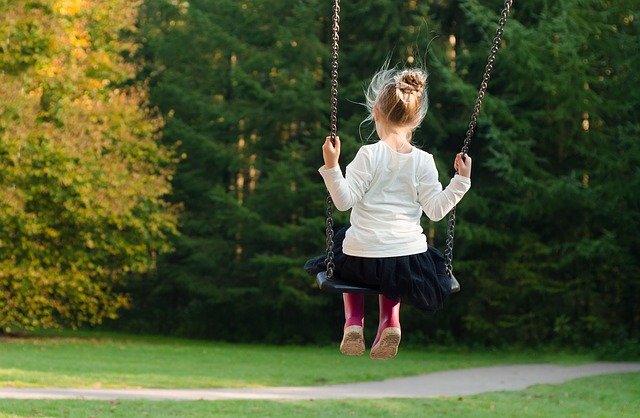
Is this the little girl I carried?
Is this the little boy at play?
I don’t remember growing older,
When did they?
Have you ever seen Fiddler on the Roof ?
It’s the tale of a Jewish milkman named Tevye who has five daughters. Those lyrics are from the lullaby he and his wife sing just before their eldest daughter gets married.
When did she grow to be a beauty?
When did he grow to be so tall?
Wasn’t it yesterday when they were small?
When you think about your children growing up, what emotions do you experience?
Do you feel hope and elation—or fear and anxiety?
Are You Scared to Let Your Kids Grow Up?
Research from the American Family Survey reveals that modern parents set arbitrary milestones to cope with discomfort about their adolescents growing up, which ultimately results in postponing their independence.
When asked what age kids should be “allowed to play at a park or walk home without adult supervision,” the answer was 13. But those same parents said they would let their kid get a job or go on a date less than two years later.

What these numbers really show is that behind the confusion is an underlying fear. But what are parents and caregivers so afraid of?
- Fear of danger. The most prevalent of all parental anxieties is the worry that our children will be harmed. This fear is perfectly normal and understandable, but the answer can’t be keeping our kids locked up like modern-day Rapunzels!
- Fear of the future or the unknown. If the COVID-19 pandemic has taught us anything, it’s that the world as we know it can change in the blink of an eye. Although we want to keep our children safe and happy 100% of the time, the reality is that so much is beyond our control. The unknown can be a scary thing—but only if you let it be.
- Fear of separation or letting go. Next time you go to a wedding, look around to see who’s bawling their eyes out. (Hint: it’s probably the parents!) Watching our kids transition to adulthood can make us feel lonely and insignificant, but part of our duty as caregivers is to set them up for independence.
Although it’s normal to have parental anxiety, being able to address and ultimately overcome your fears is important—for you and your kids. It’s not easy, but the results are so rewarding.
Here are five strategies that may work for you:
- Be a positive mirror. Keep in mind that if you’re acting afraid, your child may pick up on your emotions and start feeling the same way. As caregivers, it’s our duty to make our kids feel secure, and in many ways that begins with our own behavior. Show them how to navigate the world and its uncertainties smartly, safely, and confidently.
- Be encouraging. If you can’t handle the thought of your teen going on a date, imagine how they’re feeling right now! Remember how painfully insecure you felt when you were their age? Your teen needs encouragement more than anything. Reassure them that, as Rainer Maria Rilke once wrote, “no feeling is final.” Whatever they’re feeling and experiencing will eventually sort itself out.
- Be honest. Encouragement is only valuable when it’s genuine and grounded in reality. If you sugarcoat life, you’re not doing your kid any favors. Take the pandemic, for example: telling your child COVID-19 will magically go away is dishonest and insincere. You may feel like you’re protecting them, but at what cost? A better approach is to explain the effects of the virus and educate them on how to stay safe.
- Be communicative. When my daughter Pia was a teenager, we would have disagreements about her going out with her friends and me not knowing where she was. Finally, she came to me one day and asked, “Mom, what can I do to reassure you that I’m safe?” We agreed that a simple text message informing me where she was and who she was with would ease my worry. Problem solved!
5. Be there. I cannot stress the importance of this last tip: let your child know that they can come to you anytime, anywhere, whatever they need. Listen to them. Empathize with how they feel. Just be there.
Don’t let fear cripple you from being the best parent you can be. Face your anxieties head-on and take concrete steps to overcome them so that you can be at peace with your child getting older.
And if you feel like you can’t cope on your own, by all means ask for help! It takes a village to raise a child and the Conscious Parenting Revolution is happy to be your support network.
Join our Facebook group to catch our coaches live streaming Tuesday Tips for Parents, every Tuesday at 6:10 pm PST. We’d love to see you there.
Love and Blessings,
back to top
© 2003 - 2023 KATHERINE WINTER SELLERY | PRIVACY POLICY | PAYMENT TERMS | TERMS OF SERVICE

JOIN MY FACEBOOK COMMUNITY
@Conscious Parenting
CONTACT NOW

Download The Ebook
7 Strategies To Keep Your Relationship With Your Kids From Hitting The Boiling Point
Read This If You’re Terrified Of Growing Up
- https://thoughtcatalog.com/?p=654637

There’s this moment we have as children. It’s usually when we’re being told to do something we don’t want to, like chores or adhering to a strict bedtime. Or maybe it’s when we see a babysitter or some cool, older adult that seems to have it all. No rules! They’re in charge of their own life! It looks so awesome. And can’t wait until, one day, that’ll be us.
We’re so anxious to grow up.
…Until we actually start growing up.
That’s when reality hits. That’s when all those fantasies we had as little kids are brought crashing to the ground and we realize being an adult isn’t a free ticket to paradise. Being an adult is hard. It’s responsibility and sacrifice and this panicky feeling in your stomach that you’re behind everyone else your age.
But it’s also amazing. It just might not be what we envisioned.
Being scared to grow up is natural. Every day, you’re diving into uncharted territory. Every year, you’re changing and evolving and taking on new challenges. And as exciting as that is, it can also bring about a lot of fear. Where are you going? What are you doing? Are you on the right path?
Here’s the thing, EVERYONE feels that way. At least some of the time.
We all question ourselves. We all yearn for easier times, when it didn’t feel like life was all about paying bills and resumes and friends getting married.
Nobody has it all together. Even the person who is putting on a seemingly perfect show has doubt. Even the person you think has everything might be struggling in some unseen way.
As we age, it brings new heartaches and joys. That’s the duality of life. It’s not just one way or the other. When you cry out, “Adulting is so hard!” there will come a day when you get do something or have an experience that is so insanely amazing, and one you only get to do because you’re growing up.
It’s okay to be scared. It’s okay to talk about it, too. You’d be surprised how many people in your life feel similarly.
At the end of it, every adult has that inner child questioning if they’re doing this right. Every adult is scared to screw things up.
About the author

Ari Eastman
✨ real(ly not) chill. poet. writer. mental health activist. mama shark. ✨
More From Thought Catalog
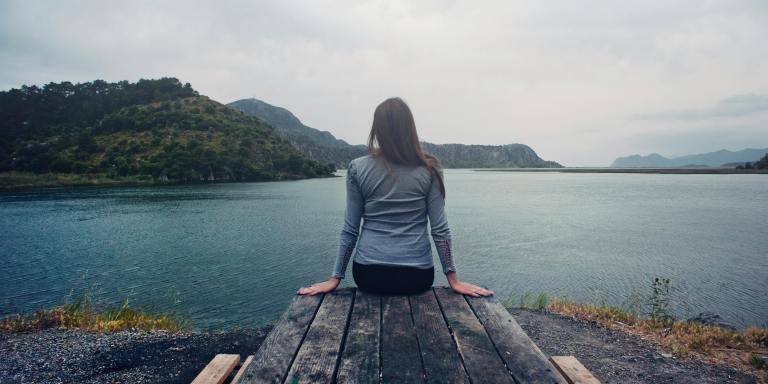
Why U=U Needs to Be Everyone’s Business

This Dark ‘The Breakfast Club’ Theory Will Change The Way You Think About The Movie

You Deserve More Than A Bare Minimum Man

8 Lessons In Life And Love I Learned From ’27 Dresses’

Why You Should Stay Single, Based On Your Myers-Briggs Personality Type

Read This If You’re Worried That You’ll Never Find ‘The One’

11 Ways To Ease Adulting Anxiety And Beat The Fear Of Growing Up
Disclosure: this page may contain affiliate links to select partners. We receive a commission should you choose to make a purchase after clicking on them. Read our affiliate disclosure.

Let’s face it: “adulting” can be excruciating at times.
There’s work and family obligations, household chores, a seemingly endless array of bills, and nowhere near enough time to sleep.
One day, we’re carefree kids playing with friends during summer holidays, and the next we’re trying to figure out why our knees are making those weird sounds.
Sure, adulthood brings certain freedoms that we didn’t have when we were living with our families, but many people get seriously anxious about adulting in general.
Why is that? And how can one get over the fear of growing up? That’s what this article will aim to answer.
Speak to an accredited and experienced therapist to help you get over your fear of growing up. You may want to try speaking to one via BetterHelp.com for quality care at its most convenient.
What is adulting anxiety?
In basic terms, adulting anxiety is the feeling of fear and worry stemming from one’s coming of age and the transition from childhood to a life of responsibility and obligation. In other words, it is the fear of growing up.
The belief that one can’t handle adulthood often accompanies adulting anxiety. A person may feel overwhelmed by the reality of becoming an adult and all the additional pressure that heaps on your shoulders.
What causes it?
Fear of failure..
The number one cause of adulting anxiety is the fear of getting something wrong, or of being a failure in a broader sense.
When you’re an adult, you’re expected to be able to fend for yourself. This means maintaining gainful employment so you can support yourself and take care of your family if you have one.
But what if you can’t get a job—the job market isn’t kind to everyone and it can take a long time to find any work, let alone work that you’d like to do.
And even when you do find a job, if you do poorly at it, you risk getting fired. The spiraling thoughts that start with that possibility don’t end well…
If you lose your job, you won’t have money. Not having money means that you won’t be able to pay your rent or mortgage, or buy food. The next steps after that include destitution, homelessness, and likely illness—both for you and your loved ones. All that’s left after that is death, which is inevitable for everyone, but we’ll touch upon that more later.
The desire to remain care- and worry-free.
Children don’t have massive weights of worry on their little shoulders: that’s what their parents deal with in order to keep the littles healthy and carefree.
When kids are aware of the crushing responsibilities that come with adulthood, they “grow up too fast” and may suffer from panic and depressive issues.
When they reach adulthood, the training wheels and kid brakes come off. Now, they have accountability and responsibilities of their own, and many people don’t like that at all.
As a result, many don’t want to grow up and will go to great lengths to avoid doing so. Some might self-sabotage in school or work so as to remain in a state of arrested development. After all, adulting is hard.
If their parents are still alive, they might try to stay at home as long as possible. That way, they can continue to spend their time playing games and hanging out with friends, and—most importantly—they can continue to be cared for by their parents .
Abdication of personal responsibility.
That last factor mentioned above is often the biggest draw, because it alleviates the weight of adult responsibility. If other people are responsible for them and their wellbeing, then if everything goes to hell in their lives, it’s someone else’s fault: not theirs.
As a result, they won’t have to deal with the stress that comes with the consequences of their actions (or lack thereof). Some people even expect their families to help raise their children if they don’t want to step up to the plate and take responsibility for the results of their own procreation. If and when the kids don’t turn out the way they liked, then that becomes someone else’s fault too.
Fear of dying.
To grow up means that one is aging, which is associated with old age and death. Many people seem to feel that if they cling to their youth by any means possible, then they’ll somehow stay young forever and cheat the Reaper.
Obviously, that couldn’t be further from the truth. Death can happen at any time, and behaving like you’re still a teenager isn’t a magical elixir against imminent mortality.
Some people are scared to grow up because they are terrified of dying. They try to avoid the mere thought of dying through orthorexic eating, surgery, and so on, but that’s all superficial.
How to overcome a fear of growing up.
Like all other fear-related issues, the best way to diffuse (and thus eliminate) the fear is to recognize where it’s springing from—the root source, if you will. Much like a disease, you wouldn’t treat the symptoms without trying to discern what’s causing the problem to begin with.
With that said, here are some things that will broadly help most people who suffer from adulting anxiety.
It is a good idea to seek professional help from one of the therapists at BetterHelp.com as professional therapy can be highly effective in helping you to work through your adulting anxiety
1. Look at the shinier side of the coin.
Many people who try to avoid adulting at all costs focus on the downsides and detriments to adulthood, rather than the benefits. If you’re dealing with adulting anxiety, then turn your attention to all the plus points that come with being of the age of majority.
First off, you are now a completely sovereign human being. Were you ever held back from doing things you wanted to do at your parents’ place because of the “my house, my rules” idea? Well, when you live on your own, you make your own rules. You don’t need to ask permission to order pizza at 5am on a Wednesday or have several people over for some late-night frolics.
As long as you’re not doing anything illegal, you’re quite free to live life on your own terms. Dress how you like, get tattoos and piercings, and date whoever makes you happiest. You don’t have to justify your choices to your family, nor do you require their permission or blessing to do anything anymore.
Your life: your rules.
This is especially important to remember when and if someone tries to guilt or manipulate you by informing you that you need to “take responsibility” for one thing or another. It’s important to look behind their words to their motivations if and when they pull this on you. Are they trying to get you to do something for them? Or shift you into a direction that you don’t want to take?
Whenever it comes to a responsibility or obligation, determine how you’ll benefit from it in turn. Think of it like an investment or a reward. If you take responsibility for cooking a meal, you’ll have tasty food to enjoy and share with others. But if you’re being asked to do manual labor for someone, what’s in it for you? Has there been an agreement regarding monetary compensation? Or are they just trying to get free labor out of you?
You have a set number of minutes to live, so choose how you spend your time wisely. Don’t let people try to force you into doing things you don’t want to do. You are the ruler of your own life and destiny, so take the reins and move in the direction of your own choosing.
2. Recognize that there is leeway as far as obligations go.
There will be some areas in which you have to take responsibility for things, but in many other cases, you can choose which responsibilities you take on. This will depend a lot on factors like income and living situation, but there are usually options other than taking everything on yourself.
If you live alone, you may have to do a great deal by yourself simply because there’s no one else to do it for you. That said, if you’re making decent money, you can delegate and outsource a bit. You can pay a cleaning company to come in a couple of times a month, or sign up with a meal service to drop pre-prepared dishes at your place a few times a week.
If you have a shared living situation—with housemates or a partner—you can divide up domestic work to suit everyone’s individual strengths. As an example, if one person loves to cook and another is a clean freak, then the former can take point on meal prep while the other does a lot of the tidying.
3. Practice doing easy adult-y things (and make them fun!).
This tip works well whether you’re still young and living at home or older and trying to regroup from a bout of paralyzing existential angst.
Yes, being an adult is hard at times, and there are a number of things we *have* to do in order to stay alive and reasonably functional. These include bathing, keeping our clothes relatively clean, and feeding ourselves. Since these are necessities that will have to be done by us, the best thing we can do is try to see them less as “chores,” and more like opportunities.
Basically, change the dialog from “I HAVE to do X” to “I have the OPPORTUNITY to do X.”
Make bathing and self-care more pleasurable by using products that you love. Spend a bit of extra money on body wash or shampoo that makes you feel amazing.
Do you hate doing laundry? Analyze why. Is it because you feel like it’s a waste of time? You could be doing something else you love instead? That’s not an excuse if you have your own washer/dryer, but is understandable if you need to go to a laundromat weekly to wash all your stuff. If you’re stuck doing the latter, try to make it as pleasurable as possible.
Take a book or tablet with you and do something you love while everything is washing and drying. Then take everything home, turn on the TV, and fold while being entertained. Before you know it, all will be folded and put away, and you’ll have caught up on your show.
How about food? Can you cook, or do you just get takeout? Expand your repertoire by learning how to make the dishes you love best. This might involve asking your parents or grandparents to teach you how to make that recipe you adore. Or you can find some great chefs and home cooks on YouTube and get busy in the kitchen. Make food preparation a pleasure rather than an obligation and you’ll be amazed at how much happier you feel.
The more you practice doing adult things, the less your fear of adulting will affect you, until one day it will be gone.
4. Learn to shift direction on the fly.
Doing the things above on your own will teach you to be more adaptive. Many people freak out when things don’t unfold the way they want them to, but those who can adapt to circumstances and find other solutions end up using that adaptivity in other areas of their lives.
As an example, let’s say you’re baking something but halfway through you realize that you don’t have any sugar. That’s cool… You can use honey, maple syrup, or even jam instead. Run out of laundry detergent? Grate bar soap and mix it with baking soda for a quick and easy solution.
Being able to adapt on the fly can be hugely beneficial across the board. It’ll train your mind to seek alternative solutions whenever you come across an obstacle, and you’ll soon learn that you can overcome any problem simply by finding a different way around it. If you can’t go through, then climb over or around. Or dig underneath. There’s always another solution, so there’s no need to panic. Simply change direction.
You may feel like you can’t handle adulthood, but the more you learn to adapt and roll with things rather than fighting against them or crumpling in a heap, the more emotionally resilient you’ll feel. Soon enough, you’ll be able to put your adulting anxiety behind you.
5. Stay present and focused on what you want to do now.
People often fall into anxiety spirals when they start to overanalyze everything. Their minds will drift into “what if?” land, and they’ll freak out about all the things that could possibly go wrong.
If you’re the type of person who worries about all the potential variables and is scared of growing up because of it, bring yourself back to the present moment. Do what you can with what you have right now, and deal with whatever happens when it happens.
And what if it all works out just fine? After all, how many things that you freaked out about in the past actually unfolded the way you feared they would?
Try to think back to when you were a child and were utterly engrossed in what you were doing. When you were a toddler, did you spend your time trying to figure out what training you’d need to do a triathlon? Or were you focused entirely on learning how to walk?
Furthermore, when you learned how to walk, do you think you were concentrating on placing each foot in front of the other? No. Your goal was to get yourself over to the cookie you were eyeing or the dog you wanted to pet. Your body followed your mind and did what was necessary to get you to your chosen destination.
Aim to get back into that mindset. If there’s something you want to do now, put your thoughts and energy toward attaining that goal—not all the maybes that may unfold down the line. You don’t think about inhaling and exhaling when you’re out for a walk; you just walk. Do the same with every endeavor you undertake, and you’ll feel a lot less anxiety overall.
On a similar note…
6. Enjoy the learning process.
Just about all of us have known at least one person who has held back from doing something they loved because they didn’t know how to do it already and didn’t want to screw up. The motivations and explanations behind these behaviors may vary, but ultimately the fear of failure is what held them back from a lot of joy and accomplishment.
After all, if they didn’t try it at all, then they wouldn’t fail for sure, right? But that’s a terrible way to live a life.
Remember the toddler making their way toward the cookie? How many times do you think you fell on your ass when you were learning how to walk? More times than you could count, most likely, yet you persevered. Furthermore, you probably don’t remember falling down much at all.
You once had to learn everything you know now, and this is pretty much the same for every skill on the planet. The unknowns that terrify us are swiftly forgotten after we’ve practiced them for a while. You may hate being an adult, but that feeling will subside the more you practice, the more you learn, and the more you master the things you must do as an adult.
Have you ever been nervous about all the skills you needed to learn at a new job, but then after a month or two, you did them all like they were second nature? Much of life is that simple. What initially seems daunting and scary ends up being the easiest thing in the world after you’ve done it a few times.
The key here is to…
7. Allow yourself to fail.
This is a vital part of the learning process, and it is pretty much inescapable. Just like little toddler you face planted when learning to walk, adult you is going to mess up in a lot of different ways.
Unless you’re juggling chainsaws to impress someone, there’s little that can’t be fixed after you’ve messed up. Mistakes at work can be rectified. Broken items can be repaired or replaced. Missteps in relationships can be worked through with communication.
Once you recognize and accept that you ARE going to mess up, then you’ll feel a lot less anxiety about it. It’s kind of like knowing that you’re going to get wet because it’s raining outside. Instead of avoiding every raindrop, you just let the rain fall and change into dry clothes when you get home.
As soon as you’re no longer bracing against a situation, it stops being a big deal. It’s a case of “yeah, this is going to suck, but it’s not going to last forever.” You’ve been through some uncomfortable or challenging things before, right? Are you still going through them? Probably not.
In fact, you might not even think about those things anymore at all. They might have terrified you when you were gearing up to face them, but now they don’t come to mind unless someone else actively mentions them or you find weird mementos that remind you of them.
Failing is actually a gift in your circumstances because it will remind you that what you imagine in your head as you battle adulting anxiety is always going to worse than the worst case scenario in reality.
8. The most daunting situations are almost always less insurmountable than you think.
Have you ever avoided doing something because you just knew it would be a massive bugbear? Maybe it was paperwork that you were nervous about attending to or a cleaning project that was so intense that you were overwhelmed to the point of paralysis. Either way, there are only two options when it comes to situations like these:
- Ignore it and let it build until it becomes atrocious to deal with
- Face it, and get it over and done with
I’ll give you an example here. For a few years, we’d had a ton of stuff accumulating in a storage room in the basement, and it was a nightmare in there. We had been avoiding even going into that room because the awareness of just how much work needed to be done to clear it out was too overwhelming. As a result, the mess of boxes, old TV sets, and various bits of detritus just sat there.
We kept avoiding taking care of the issue because there was always something “more important” or fun to do instead.
Finally, we agreed that if we didn’t take action, that room would remain unusable forever. So we set aside a few days to finally take care of the issue. We geared up with old clothes and rubber gloves, put on some great tunes, and resigned ourselves to the fact that we were about to “waste” about three days clearing that mess out.
Do you know how long it took us to clear it out entirely? A few hours.
What we had assumed would be a monumental task that would eat away days of our lives ended up being over and done with in less time than we would have spent watching The Return of the King . Best of all, we discovered some absolute treasures as we cleared that space out. There were childhood photos we had forgotten about, a favorite screwdriver we had given up as lost, and so on.
Best of all, the relief and sense of accomplishment we felt after clearing it out was indescribable. That was a massive task crossed off our to-do list, and unless some natural disaster strikes, it’s unlikely we’ll ever have to do that again. Even better, we now had more space in the house to work with!
Know that this type of experience is common as you move through life, and tackling it head on is almost always the best course of action. Face your fears and anxieties, and you’ll discover that they’re usually as easily transmuted as the previous tasks.
9. Work on discovering your inner strength, and know that you’ve got this.
One reason why so many people have anxiety about adulting is that other people have tried to take their personal power from them.
This often happens when someone has insecure or controlling parents. Instead of being taught vital life skills and being encouraged to take care of problems on their own, these folks are coddled and either overprotected or prevented from becoming more independent.
This is because the parent has made their children their reason for being, and if the kids develop a strong sense of self, then the parent doesn’t know what to do with themselves anymore.
The way to overcome this is to become your own pillar. Learn how to set boundaries, and defend them well. Become your own best advocate, and spend your time and effort working on the skills and strengths you know you have.
Pursue educational and career paths that are important to you, not other people. Develop hobbies and skills that make you happy, rather than pandering to others’ wants or suggestions.
Most importantly, know that you’ll figure it out. If others are trying to make you feel fearful so you stay dependent on them, don’t let their fearmongering hold you back. No matter what happens, you’ll get through it. People have been muddling through existence on this planet for hundreds of thousands of years, and they’ve been doing just fine. You will too.
10. Don’t be afraid to ask for guidance.
Are there older or otherwise more experienced people in your life whom you can turn to for instruction or guidance? If so, don’t hesitate to reach out to them for advice when you feel like you need it. After all, these are people who have a lot of life experience under their belts. They’ve been through a lot and have accrued a massive amount of life skills.
It can only benefit you to learn from their experience, as long as they aren’t going to treat you badly in the future because of it.
Some elders like to lord things over younger people and make fun of them for needing help. If the older folks you know are thusly inclined, then you’re likely better off to muddle through on your own, figure things out by watching tutorials online, or ask friends who can teach you instead.
That said, if you’re lucky enough to have parents or grandparents who have helpful skills and are eager to pass their knowledge on to the next generation, then let them do so. You never know when the skills they teach you may come in handy. I wouldn’t know how to handle an axe if I hadn’t asked my Grandpa to teach me how to chop wood, and my partner’s cooking skills were honed by her grandmother’s side.
If you don’t have family members like this, then see if you can connect with others in your community. There are usually learning opportunities at community centers or even meetup groups that you can join. At places like these, you have the chance to draw on the knowledge that others have accrued, while offering them your time and friendship in return.
Furthermore, even if certain methods seem a bit antiquated, you can either adapt them for modern needs or use them as-is if required. For instance, you may have the world’s most high-tech oven in your kitchen, but if an elder teaches you how to rig up an outdoor camp stove, you’ll still be able to cook if there’s a major power outage.
Yes, you’re a strong, independent adult, but that doesn’t mean that you’re all alone in the world. There are always resources available to you, if you’re open to them.
11. Make peace with the idea of death.
This isn’t meant to be a downer, and it shouldn’t make you feel afraid of anything. Far from it. In fact, we’re hoping to inspire the opposite effect, here.
Many people are absolutely terrified of the idea of death. As a result, they either live recklessly as if to thumb their noses at mortality or cling to an age in which they felt safe from the grim specter of death that’s looming on the road ahead of them.
When you make peace with the fact that all of us have an expiry date, however, it’s an immensely freeing experience. You don’t have to worry about avoiding it because it’s inevitable, so that’s a massive weight off your shoulders.
Furthermore, it’s freeing to realize that you have carte blanche to live your life to the fullest, in exactly the manner you want to, because it’s all going to end one day.
So many people say, “If I knew I was dying, I would do X thing I’ve always wanted to do.” They hold back from doing what’s authentic and important to them thanks to other people’s judgements or fear of potential failure. The only thing that would allow them the freedom to do what they wanted is if they knew it would all be over soon, and they’d only have a small window of opportunity to do that thing.
Do the thing. None of us know how much time we have left, but accepting that on a soul-deep level allows us to live life fearlessly. There’s nothing to be afraid of, other than an unlived life.
Remembering the phrase “memento mori” (remember death) isn’t meant to be scary, but is instead a reminder to be present and enjoy every moment, since we might never have another.
Rather than thinking of life as “growing up,” simply see it as “growing.” You’re here to experience amazing things and to have joy. Don’t hold yourself back from that due to fear of the unknown or failure. There is nothing to fear.
Still not sure how to stop being scared of growing up? Talking to someone can really help you to handle whatever life throws at you. It’s a great way to get your thoughts and your worries out of your head so you can work through them.
Speak to a therapist rather than a friend or family member. Why? Because they are trained to help people in situations like yours. They can help you to challenge your thoughts and offer tailored advice to make you feel more comfortable about being an adult.
BetterHelp.com is a website where you can connect with a therapist via phone, video, or instant message.
While you may try to work through this yourself, it may be a bigger issue than self-help can address. And if it is affecting your mental well-being, relationships, or life in general, it is a significant thing that needs to be resolved.
Too many people try to muddle through and do their best to overcome issues that they never really get to grips with. If it’s at all possible in your circumstances, therapy is 100% the best way forward.
Click here if you’d like to learn more about the service BetterHelp.com provide and the process of getting started.
You’ve already taken the first step just by searching for and reading this article. The worst thing you can do right now is nothing. The best thing is to speak to a therapist. The next best thing is to implement everything you’ve learned in this article by yourself. The choice is yours.
You may also like...

19 signs a man is silently struggling and needs your support

20 signs you didn’t get the emotional support you deserved in childhood

12 Good Things That Happen When You Are Able To Say “I Made A Mistake”

How To Humbly Admit When You Don’t Know Something (6 Tips)

11 Reasons It’s Hard To Admit You’re Wrong, According To Psychology

8 Tips To Help You Own Up To Your Mistakes

How To Admit You Were Wrong: 12 Tips If You Find It Difficult

10 Ways To Accept Your Flaws And Embrace Your Imperfections

10 Ways To Overcome Your Fear Of Looking Stupid
About The Author

Finn Robinson has spent the past few decades travelling the globe and honing his skills in bodywork, holistic health, and environmental stewardship. In his role as a personal trainer and fitness coach, he’s acted as an informal counselor to clients and friends alike, drawing upon his own life experience as well as his studies in both Eastern and Western philosophies. For him, every day is an opportunity to be of service to others in the hope of sowing seeds for a better world.

Growing Up Scared
8 Bold Ways to Overcome Your Fear of Writing
by Sarah Gribble | 0 comments
Today I want to talk about fear. Fear of writing, fear of sharing your work, fear of publishing—and how you can overcome it.
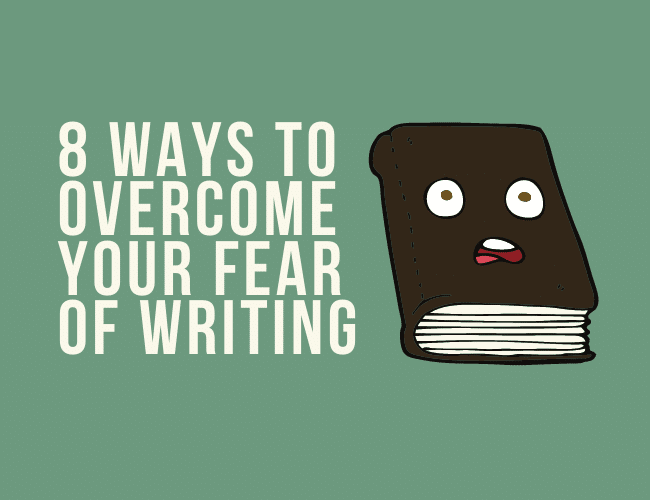
Writers face fear on a day-to-day basis.
The self-doubt . The fear of failure. And, oh, the vulnerability.
Writing is hard enough with all the self-evaluation and doubt about your abilities. But then sharing your work with other people so they can critique or review it? CRINGE.
When you sink into that fear it debilitates you. If you let fear hold you back, you’re ensuring you never achieve your goals. You’ll never write that book and you’ll never get published. All because you were too scared.
8 Ways to Overcome Your Fear of Writing
It’s time to stop letting fear control you and get writing. Here’s how:
1. Do what scares you.
When you’re up against something that makes you cringe, ask yourself what the worst-case scenario is. Is it actually harmful? Unless it’s something like jumping from a bridge into a rocky river or stepping in front of a speeding vehicle, it’s probably not.
Fear is trying to keep you safe. It needs to learn that just because something is scary doesn’t necessarily mean that it’s detrimental to your health. Do what scares you, and keep doing it, and the fear will subside.
This includes fear of our own writing. I'm not saying you have to go write a 90,000 word novel. Start with a short story, or try out some writing prompts.
Aspiring writers might feel intiimdated because they don't think that they are a great writer. The reality is, you can never become a great writer unless you practice—and to practice, you have to write.
Embrace and overcome your fear by putting words down. Start writing, have patience with yourself, and worry about the rest later.
The blank page becomes way less scary as soon as you put words on it.
2. Stop procrastinating.
Your house is already clean enough. That TV show can wait. No, you don’t need to run to the store to pick up a bag of chips.
Figure out when the best time for you to write is and then write.
If you really, truly need a break to clear your mind, set a time limit. Ten minutes of scrubbing the grout with a toothbrush and then get back to your writing.
Ultimately, those who procrastinate will be more prone to writing off procrastination as writer's block—and the more time you spend away from writing, the scary it will become.
3. Learn from criticism.
Criticism is what everyone fears. Not just in writing, but in life. We all want to be liked, to be perfect, to be praised.
Your writing will not please everyone and that’s something you should realize and accept now. Criticism is much easier to take when you go into it knowing that fact.
Don’t just ignore criticism, though. Writing is like everything else in that it requires practice. You don't have to rank #1 on Amazon or make a bestseller list your first go (even though I won't argue that would be fantastic).
The first meal you cooked wasn’t a gourmet meal. The first time you dribbled a basketball wasn’t Lebron-level. Someone was there to point out what you were doing wrong and set you on the right path. They taught you how to get better.
That’s what criticism is: teaching.
It's not rejecting your work, which might be why some writers fail to share their work: because their fear of rejection is mistakenly associated with getting critiques.
Yes, sometimes it’s mean-spirited, especially in this age of internet trolls. But even in those nasty reviews, there’s normally something to learn from.
Find it. Use it. And do better next time.
4. Stop revising.
You want every sentence in your work to be perfect . I have a secret for you: you’ll never get there.
Your writing will never be perfect.
Not to you, not to your editors, and not to your readers. It’s impossible, so stop revising ad nauseam. At some point, you have to let it go and put the work out there.
Perfectionism can stunt your creative writing instead of empower it.
To avoid this, set a limit. I prefer three drafts. That’s it. Three and then I let it fly on its own.
What are you writing for? We'll never know unless you decide to share your work.
5. Set goals and move toward them.
Focus on milestones like daily word counts and deadlines (self-imposed or otherwise).
Writing a book is like summiting a mountain: you do it one step at a time . When you reach the top you might be a little exhausted and out of breath, but you’ll look back at all you’ve accomplished and feel proud.
Without these smaller milestones, it might be hard to finish your piece of writing, or even find the motivation to keep writing each day.
Stories are finished one day at a time, with hard work and a desire to grow your writing process.
Don't sweat the small stuff in your first drafts, like word choice. Instead, set a long term goal of continually learning how to write better and smaller milestones that will help you finish stories you start.
All of this is accomplished word by word, and by turning real and irrational fears into manageable tasks.
6. Embrace the fear of writing.
You’re going to be scared frequently in this business. My stomach still flips every time I submit a short story , even though I’ve submitted hundreds of times. It’s going to happen.
The trick is to acknowledge it and move forward. It didn’t kill you.
In fact, that little tingle of fear should be your signal to celebrate. You did what scared you and that’s amazing.
One book that a lot of writers really love on this subject is The War of Art by Steven Pressfield. If you're feeling discouraged or swallowed by your fear, check out this book for some motivation.
Even better, find and join a writing group like we have here at The Write Practice. Nothing helps you overcome your fears like a supportive community with a kindred creative spirit.
7. If your character can do it, so can you.
You don’t let your characters sit back on their heels because they’re scared, do you? I hope not, because if you do, you don’t have a story .
Your characters don’t have the luxury of sitting on the bench. They must make decisions and do something about the problem. And so should you.
Don’t let fear of writing take over your writing life. Decide to move forward, to write that book, to send out that manuscript. Decide and then do it.
8. Ask for help if you need it.
Don’t be afraid to ask for time to yourself so that you can write. Your family and friends will understand you need that time because writing is important to you.
Find a group of writers and readers that can go through your story and give constructive feedback. You can't improve in a vacuum.
Need to know what a day in the life of a flight attendant looks like, or the lingo of a truck driver? Ask them. Trust me, you’re not bothering them. People love talking about themselves.
In the same vein, if you need help with research, that’s literally what librarians are for. They’ll be glad to help.
Don’t let fear of asking for help stagnate your writing.
Embrace the Fear
I want to leave you with these words from Carrie Fisher:
Your fears are natural and normal. They're also not the end of the story.
Your task, the challenge for every writer, is to face that fear of writing, acknowledge it, and write, share, publish anyway .
Need extra motivation? Have you checked out The Write Practice’s 100 Day Book program ? It’s the best way to stop letting fear of writing control you and get that book done. Click here to find more information on the course.
What scares you most about writing and/or the business side of writing? What are some steps you can take to overcome that fear? Let me know in the comments !
Today I want you to spend fifteen minutes writing about a time you were scared to do something but did it anyway. Describe the exact feelings of fear you had. How did you feel after you'd done what scared you?
When you’re finished, share your work in the Pro Practice Workshop here (and if you’re not a member yet, you can join here ).

Sarah Gribble
Sarah Gribble is the author of dozens of short stories that explore uncomfortable situations, basic fears, and the general awe and fascination of the unknown. She just released Surviving Death , her first novel, and is currently working on her next book.
Follow her on Instagram or join her email list for free scares.
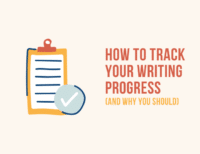
Work with Sarah Gribble?
Bestselling author with over five years of coaching experience. Sarah Gribble specializes in working with Dark Fantasy, Fantasy, Horror, Speculative Fiction, and Thriller books. Sound like a good fit for you?
Trackbacks/Pingbacks
- 8 Bold Ways to Overcome Your Fear of Writing | rogerpseudonym - […] “ Stay afraid, but do it anyway. What’s important is the action. You don’t have to wait to be…
- A New Writer’s Fear – My Writing Experience - […] 8 Bold Ways to Overcome Your Fear of Writing The Write Practice […]
- Team Names - Cool, Awesome, Funny and Tough Names for Teams - […] below names are for those that are tough, strong, badass team. Any team that specializes in being bold with…
Submit a Comment Cancel reply
Your email address will not be published. Required fields are marked *
Submit Comment
Join over 450,000 readers who are saying YES to practice. You’ll also get a free copy of our eBook 14 Prompts :
Popular Resources
Book Writing Tips & Guides Creativity & Inspiration Tips Writing Prompts Grammar & Vocab Resources Best Book Writing Software ProWritingAid Review Writing Teacher Resources Publisher Rocket Review Scrivener Review Gifts for Writers
Books By Our Writers

You've got it! Just us where to send your guide.
Enter your email to get our free 10-step guide to becoming a writer.
You've got it! Just us where to send your book.
Enter your first name and email to get our free book, 14 Prompts.
Want to Get Published?
Enter your email to get our free interactive checklist to writing and publishing a book.
Growing Up Essay: Guide & Examples [2024]
What does it mean to grow up? Essays on this topic might be entertaining yet challenging to write. Growing up is usually associated with something new and exciting. It’s a period of everything new and unknown.
Now, you’ve been assigned to write a growing up essay. You’re not a kid anymore, but not quite the adult. It would be interesting for your teacher to learn about your childhood memories or read what you think about the experience of growing up.
That’s why:
In this article, we will provide a guide on how to write an essay on growing up. Our team listed some topics to make your writing process more manageable.
- 📍 How to Write It
🏡 About Your Childhood
🧒 about someone else.
- 👧 Growing Up
🔗 References
📍 how to write a growing up essay.
Writing an essay about growing up can seem complicated, but it’s always easier to handle when you have a plan. In this section, we will talk more about how to write an essay on the topic.
- Reflective essays focus on the author’s attitude towards individual experiences. This type is often required during the college admissions process. For instance, one may write about growing up in poverty and how it shaped his character.
- Narrative essays focus on a specific event or sequence of events. For example, you might write about the most memorable trip from your childhood.
- Choose the topic on the familiar subject. It will be easier to reflect on the issue when you have a lot of relevant experience.
- Choose the topic of interest. Write about something that provokes a strong emotional reaction from you.
- Show a unique vision on the topic. Try to approach writing college essays about growing up from a different perspective. When writing a narrative essay, you need to remember that your work should tell a story. Your essay topic about growing up needs to agree with the paper’s length and follow the essay structure. Focus on a specific point in your writing.
- Think about the event in your life that provokes a strong emotional response;
- Write what you have learned from the experience;
- Consider writing about experiences with your friends or relatives. What those events taught you?
- Introduction : Your growing up essay introduction is an opening paragraph of the work. It grabs a reader’s attention and contains a thesis statement.
- Body Paragraphs : The childhood and growing up essay can contain three body paragraphs. In each one, provide an example of an event or situation that supports the general topic.
- Conclusion : In your growing up essay, the conclusion is the final paragraph. It summarizes the main points and brings the paper to an end.
- Revise your draft a couple of days after writing it. That way, you will be able to notice mistakes or typos you missed.
- Try to avoid passive voice . Rewrite the sentences in an active one, if possible.
- Read your essay out loud. If it doesn’t meet the set criteria, keep revising it.
👩👦👦 Growing Up Essay Topics
You may not know what your essay on growing up should be devoted to. If it’s the case, look at this section. Earlier, we talked about how to write, but here we will tell you what to write about.
See the topics that can navigate an essay about your childhood experience:
- Your family values and how they have been shaping your personality. Engage in reflective writing to show how certain factors of growing up influenced your character. What do you think were the effects of your growing-up period?
- What various roles have you had in your family? How and why did they change? As children grow, the family adjusts accordingly. Remember your roles as a child, adolescent, and young adult . How did they change?
- Your personal changes over the course of growing up. Write an essay describing your personal development. What caused those changes?
- Sudden adulthood. Write a “growing up too fast” essay. Reflect on your feelings and emotions about growing up so suddenly.
- Growing up with siblings. Write an essay about your childhood experience in a house where you weren’t the only child. Remember what it was like growing up with blood brothers and sisters? Or, maybe you have step-siblings? How did it influence you?
- A short memoir. You don’t need to have a dramatic adolescence or an out-of-ordinary story to write about yourself. Share your most exciting stories from childhood.
- A significant event from my childhood.
- Personal experience of parenting styles .
- Describe the events that helped you to learn about life.
- Tell about the time you tried to challenge gender norms.
- Analyze your experience of growing up in another culture and the influence it had on your adult life.
- Most memorable Christmas of my childhood.
- Discuss how the relationships with your parents influenced your growing up and character formation.
- Describe the experience of self-disclosure in your childhood and the consequences it had.
- How I used to cope with stress at high school.
- Write about your family trips and the effect they had on the relationships within your family.
- Analyze how the relationships with your peers impacted your growing up and adult life.
- How I learned to ride a bicycle .
- Examine how different teaching styles you’ve experienced in childhood influenced your growing up.
In other words, try to focus on something that made your growing up experience memorable and tell about it.
What if you do not feel like talking about your own experience in the essay on growing up? Do not worry. There are many other ways to complete your paper.
What follows next are additional ideas for you:
- Write essays on growing up based on a work of literature or songs. Choose your favorite piece of literature or a song that talks about growing up. Write several paragraphs about the portrayal of the growing up period in music or literature.
- Write essays on growing up with a single parent. Write an essay about growing up without a father or mother. What is it like? What impact can it make on a person’s character?
- Write about growing up without parents . A childhood spent in an orphanage or with distant relatives can have lasting consequences. Think about the effects it can have on a person’s character.
- Write an essay about growing up in a small town. Think about the advantages and disadvantages of living in a small town . Why do you think it’s good or bad to live in a small town?
- Write about youth growing up fast. Children become adults quite quickly. Discuss the possible reasons for children to grow up faster.
- What happens to the mentally challenged children when they grow up?
- Examine how Nhuong depicted childhood in the book Water Buffalo Days: Growing Up in Vietnam .
- Discuss the changes digital technology brought into a growing-up process.
- Childhood’s effect on adulthood: the story of John Wayne Gacy .
- Explain how the environment influences the growing up and physical development of a child.
- Describe the relation between difficult childhood and personal development .
- Description of lost childhood in Night by E. Wiesel.
- Analyze the consequences being bullied or being a bully in childhood may have in adult life.
- Frank Conroy’s childhood in his book Stop-Time.
- Explore how childhood development and growing up shown in Born to Learn video .
- Examine the stories about coming of age and infantilism in literature.
- Discuss the peculiarities of growing up in multiracial family.
- Analyze the authors experience in Country Pride: What I Learned Growing Up in Rural America by Sarah Smarsh .
- Describe the problem of childhood obesity and the ways it influences children’s life.
👧 Growing Up Topics for College Essays
Writing a college essay about growing up essay is a great opportunity to reflect on the challenges and triumphs that made you who you are. Here are some compelling essay prompts and topics that will help you share your unique coming-of-age experience.
- Essay on how growing up has shaped my life. Describe the pivotal moments from your upbringing that have had an impact on your personality and aspirations. You may also reflect on the lessons learned from your family, friends, community, and cultural surroundings. How did these experiences shape your values and worldview?
- What are the effects of growing up in poverty? Essays on this topic can explain how growing up in financially disadvantaged circumstances shapes people’s lives. If it’s something that resonates with you, you can write about it in your college essay. For example, describe the challenges you’ve faced and the experiences that have fostered your resilience. You can also analyze how these circumstances have impacted your values, such as a passion for social justice.
- What are the challenges of growing up? Consider the impact of family dynamics and cultural influences on your personal development. You can also discuss how overcoming these challenges has influenced you as a person and how it made you stronger.
- Is taking risks a necessary part of growing up? An essay on this topic can discuss the potential benefits and drawbacks of taking risks at a young age. Is taking risks an essential part of maturing and gaining independence, or are there other ways to learn? Remember to provide examples to illustrate your point.
- Fear of growing up. For this essay, consider how young people grapple with the challenges of transitioning to adulthood. What anxieties are associated with leaving behind the safety of childhood? Discuss the potential consequences of the fear of embracing adult responsibilities and provide real-life examples.
- Explain how peer influence shapes a person’s identity.
- The challenges of being the oldest sibling.
- How does one’s cultural background determine one’s childhood milestones?
- Social media and the coming-of-age experience.
- How education shapes a person’s future opportunities.
- The impact of childhood experiences on adult development.
- Explore the influence of gender identity on your journey to adulthood.
- The connection between your childhood hobby and adult career choice.
- The importance of self-discovery in the process of growing up.
- Write about the challenges and joys of adolescence.
📝 College Essay about Growing Up: Example
For your inspiration, we came up with a growing-up college essay example. It will provide insights into the content and structure and help you write an outstanding paper.
I have always been captivated by the world of art. Throughout my childhood and adolescence, I have been experimenting with different forms of self-expression, such as painting and sketching.
As a child, I was fortunate to have a supportive family that nurtured my love for art. My mother enrolled me in an art class and was always ready to provide me with supplies. All this helped foster my creativity to the point where I decided to pursue an art education in college.
During my teenage years, I was surrounded by a diverse group of friends who shared my interests. We went to galleries, attended art events, and collaborated on projects. These friendships enriched my artistic perspective even further. They also taught me about the diversity of creativity and expression.
In addition to art, I have various hobbies that help me become better at what I do. In particular, I enjoy reading non-fiction about renowned artists. Aside from traditional art forms, I also experiment with photography and digital design.
My family and friends played a major role in my decision to pursue a career as a creative. Their support and my belief in the power of self-expression will help me contribute to our school and the whole community.
Thank you for reading this article! Hopefully, you found the information written here useful. If so, don’t forget to comment and share this article with your friends.
This might be interesting for you:
- School Days Essay: How to Describe a Memorable Event
- Childhood Memories Essay: Brilliant Writing Ideas
- Writing Essay about Someone Who Has Made an Impact on Your Life
- Excellent Remembering a Person Essay: Free Writing Guidelines
- Life Experience Essay: How to Write a Brilliant Paper
- Essays that Worked: Hamilton College
- Essay Growing Up: Bartleby
- Narrative Writing: Brigham Young University
- Reflection Essay: Kent State University
- My Childhood Memories Essay: Cram
- Share to Facebook
- Share to Twitter
- Share to LinkedIn
- Share to email
![scared of growing up essay Murder Essay: Examples, Topics, and Killer Tips [2024]](https://custom-writing.org/blog/wp-content/uploads/2020/12/man-holding-gun-as-evidence-284x153.jpeg)
Probably, a murder essay is not a fascinating assignment to complete. Talking about people’s deaths or crazy murderers can be depressing. However, all assignments are different, and you are supposed to work on every task hard. So, how are you going to deal with a murder essay? You can make...

Are you a nursing student? Then, you will definitely have an assignment to compose a nursing reflective essay. This task might be quite tough and challenging. But don’t stress out! Our professionals are willing to assist you.
![scared of growing up essay Environment vs. Development Essay: Tips & Topics [2024]](https://custom-writing.org/blog/wp-content/uploads/2020/12/storage-tanks-284x153.jpg)
Environment vs. development is a multifaceted present days’ dilemma. On the one hand, environmental problems are increasing year after year. We have more polluted areas on our planet, more polluted rivers, fewer trees that produce oxygen. On the other hand, can we stop development and progress in various fields? Is...

What does an essay look like? At a glance, the answer is obvious. An essay looks like a mere piece of paper (one page or several pages) with an organized text. It’s generally divided into five paragraphs, though there may be more. The essential essay structure includes: Yet, will this...

Some students find writing literary analysis papers rather daunting. Yet, an English class cannot go without this kind of work. By the way, writing literary analysis essays is not that complicated as it seems at a glance. On the contrary, this work may be fascinating, and you have a chance...

These days, leadership and ability to work in a team are the skills that everybody should possess. It is impossible to cope with a large educational or work project alone. However, it can also be challenging to collaborate in a team. You might want to elaborate on importance and difficulties...

Racial profiling is not uncommon. It’s incredibly offensive and unfair behavior that causes most of the protests in support of people of color. It occurs when people are suspected of committing a crime based on their skin color or ethnicity. Unfortunately, most people are unaware that racial profiling is an everyday...

Without a doubt, a natural disaster essay is a tough paper to write. To begin with, when people encounter a disaster risk, it’s a tragedy. Emergency situations can affect hundreds, thousands, and millions of people. These are the crises and events that change people’s lives drastically. So, disaster and emergency...

“You are not only responsible for what you say, but also for what you do not say”Martin Luther There are a lot of other good quotations that can serve as a good beginning for your essay on responsibility and provide good ideas for writing.

Exemplification essays, which are also called illustration essays, are considered one of the easiest papers to write. However, even the easiest tasks require some experience and practice. So, if you are not experienced enough in writing exemplification essays, you will face certain challenges.

You push the snooze button once again and finally open your eyes. It is already 8:50, and your classes start at 9. “I’m going to be late again!”— you think, already in full panic mode. In a minute, you rush out the door half-dressed, swallowing your sandwich on the go. ...

An essay about Harriet Tubman is to focus on the biography and accomplishments of a famous American abolitionist and political activist of the 19th century. Harriet Tubman was born into slavery, escaped it herself, and helped others escape it. She changed many jobs throughout her lifetime, being a housekeeper, a...
I’m so happy to find your site. I like your posts on writing various papers! Now I’m working on my essay on growing up, and your post on this topic is very helpful for me!
Marvelous tips for writing essays on growing up! Thanks so much for this! I’m a fan of your blog!
Things you buy through our links may earn Vox Media a commission.
- The Conspiracy of Silence to Protect Joe Biden
The president’s mental decline was like a dark family secret for many elite supporters.
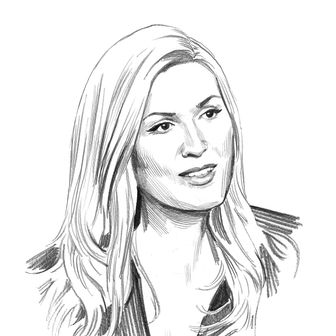
President Joe Biden walked before a row of flags and took his place at a lectern stamped with the presidential seal. A few feet in front of him, thin panes of teleprompter glass, programmed with prewritten remarks, were positioned to meet his stare as he spoke into a microphone that would carry his voice through a soundsystem. His White House press secretary looked on. So did several senior White House officials. Anxiety clung to the humid summer air. What the president was about to say might determine the future of his presidency and perhaps the Republic itself.
Yet this was not to be some grand pronouncement about war or peace or a shift in domestic policy. He was not delivering an official address or even a rally speech. He was not onstage in a stadium or auditorium or perched on a platform in a gilded government or hotel ballroom. He was not speaking to a crowd of thousands or even hundreds. There would be no video of his statement carried live to the world. There would be no photos. And there would be no published audio.
In a tent on the backyard patio of a private home in suburban New Jersey, the president was eye to eye with a small group of powerful Democrats and rich campaign donors, trying to reassure them that he was not about to drop dead or drop out of the presidential race.
The content of his speech would matter less than his perceived capacity to speak coherently at all, though much of what he would say would not be entirely decipherable. His words as always had a habit of sliding into a rhetorical pileup, an affliction that had worsened in the four years since he began running for president for the third time in 2020. He might begin a sentence loud and clear and then, midway through, sound as if he was trying to recite two or three lines all at once, his individual words and syllables dissolving into an incoherent gurgle.
Still, he was fine, he told the donors. Old, sure. But fine. He was here, wasn’t he? Things were actually going well by the numbers. The polls looked good. The money looked good. They were looking right at him. He looked pretty good for 81, no? Really, folks! And what choice did they have? As he liked to say, “As my father liked to say: Joey, don’t compare me to the almighty; compare me to the alternative. ” In total, his remarks would last for exactly ten minutes — long enough to inspire confidence in his abilities, advisers hoped, but not so long that he was at increased risk of calling those abilities further into question.
As always with this president, the production surrounding any public appearance — even if it was semi-private — came down to timing and control. He could not spend too much time out in the wild, and the circumstances in which he could exist in such an environment with so many wobbly variables would need to be managed aggressively. According to rules set by the White House, the traveling protective pool — the rotating group of reporters, run by the White House Correspondents’ Association, that trails a sitting president to provide constant coverage of his movements for the press corps — would be permitted limited access to observe his remarks before being whisked away from the reception, or “wrangled,” in communications parlance, and held elsewhere on the property (in a guest house, where somebody tuned an old television set to Real Time With Bill Maher ).
Obsessive efforts to control Biden were not a new phenomenon. But whereas in the last campaign, the incredible stagecraft surrounding even the smallest Biden event — speaking to a few people at a union hall in rural Iowa, say, or in a barn in New Hampshire — seemed to be about avoiding the so-called gaffes that had become for him inevitable, the stagecraft of the 2024 campaign seems now to be about something else. The worry is not that Biden will say something overly candid, or say something he didn’t mean to say, but that he will communicate through his appearance that he is not really there.
The display early Saturday evening was the last of seven campaign events held across four states in the 48 hours that followed the first presidential debate. The events were designed to serve as both proof of life for concerned wealthy patrons of the Biden reelection effort and proof of the wisdom of their choices: Other concerned wealthy people were still buying. They didn’t need to panic.
The sprawling Red Bank estate on a hill overlooking the Navesink River belonged to Goldman Sachs executive turned governor Phil Murphy. The local press had reported that hundreds were expected to attend the event. Though the $10 million property could have easily accommodated such a crowd, it was more like 50. Fewer if you subtract official staff or members of the Biden family, including the First Lady and several grandchildren. But big money comes in small packs, and Tammy Murphy, the governor’s wife, began her remarks with an unusual announcement: The couple had raised $3.7 million with their fundraiser, a number that had exceeded their goal. “This is personal for us,” the governor said. “We’re all with you 1,000 percent.” He called Biden “America’s comeback kid.” The callback to Bill Clinton articulated the nervous, defensive energy that animated the evening. But Biden had not face planted in a pit of bad press because of a mistake in his personal life. His problems would be much trickier to solve. A sex scandal might help him right now, in fact.
The president had approached the lectern with his stiff gait, which his official medical report, written by Dr. Kevin O’Connor, who has led his care since he was vice-president, attributes to a foot injury and an arthritic spine.
“I’d like to make three quick points,” Biden said. “Today we announced, since the debate, which wasn’t my best debate ever, as Barack points out, we raised $27 million.” It has long been a feature of Biden speeches to refer to the former president in this familiar way. “Barack and me” is a frequent refrain, a reminder of his service to the nation’s first Black president and a promise, too, of a return to normalcy after the aberrant rise of Donald Trump.
Although large speakers lined the patio, and although Governor and Mrs. Murphy were perfectly audible in their remarks, understanding Biden’s speech required intense focus. “POTUS was difficult to hear at times,” Tyler Pager of the Washington Post , assigned to circulate his statements in real time as the print pooler, wrote. “So please check the transcript.” The pool reporters often struggle with the challenge of how hard it is to hear or make sense of the president. Radio reporters do not always obtain usable audio of his remarks. Print reporters squint and strain and crane their necks, trying to find the best position by which their ears may absorb the vibration of his voice in the air. Reporters scrutinize their audio recordings and read quotes to one another after the fact. Is that what he said? You heard it? In that order? You sure?
Biden continued on: “Secondly, I understand the concern after the debate. I get it. We didn’t have a great night, but we’re working hard and we’re going to be working to get it done … Since the debate, the polls show a little movement and have me up a couple points.”
The donors broke into thunderous applause when the president said this about the polls. But what he said was false. Early public surveys immediately following the debate indicated that Biden was down overall a point or two, and surveys that asked respondents to rate the debate itself had him losing by mid–double digits. As a means of damage control, the campaign leaked some of its own internal polling — which had been until recently regarded as a state secret — to argue that the debate had not moved the needle: The president was losing by a slim margin before Thursday night, and he was still losing by that slim margin after Thursday night. In the days that followed, the polls would only grow grimmer .
“In fact,” Biden went on, “the big takeaway are Trump’s lies … The point is, I didn’t have a great night and neither did he.”
He returned to the central message of his campaign: “The fact is that Donald Trump is a genuine threat to democracy, and that’s not hyperbole. He’s a genuine threat. He’s a threat to our freedom, he’s a threat to our democracy, he’s literally a threat to America and what we stand for … Ask yourself the question: If not for America, who would lead the world?”
The question was posed as a reminder of the stakes of the November election. During his term in office, Trump had sought to retreat from America’s global commitments, abiding by a madman semi-isolationist theory of foreign policy that in Biden’s view and the view of many Establishment actors across the ideological divide had caused damage to the country’s reputation that will take a generation of stable leadership to undo.
Yet Biden’s comment also served as an unintentional reminder of the concerns about his own leadership. Just the day before, the Wall Street Journal had published a report that described how the president’s “frail” appearance and inconsistent “focus and performance” presented challenges on the world stage. At the G7 summit in Italy in June, Biden had the distinction of being the only world leader who did not attend a private dinner party where candid diplomatic talks would happen off-camera. At a European Union summit in Washington in October, Biden “struggled to follow the discussions” and “stumbled over his talking points” to such a degree that he required the intervention of Secretary of State Antony Blinken. (The White House denied the Journal ’s reporting.)
Under vines of white moonflowers on the governor’s patio, I watched as the president neared the end of his ten-minute speech. If a gaffe is when a politician accidentally tells the truth, he was still making them. The truth he told now was this: “I’ve got a helluva lot of plans for the next four years — God willing, as my father used to say.”
In January, I began hearing similar stories from Democratic officials, activists, and donors. All people who supported the president and were working to help reelect him to a second term in office. Following encounters with the president, they had arrived at the same concern: Could he really do this for another four years? Could he even make it to Election Day?
Uniformly, these people were of a similar social strata. They lived and socialized in Washington, New York, and Los Angeles. They did not wish to come forward with their stories. They did not want to blow a whistle. They wished that they could whistle past what they knew and emerge in November victorious and relieved, having helped avoid another four years of Trump. What would happen after that? They couldn’t think that far ahead. Their worries were more immediate.
When they discussed what they knew, what they had seen, what they had heard, they literally whispered. They were scared and horrified. But they were also burdened. They needed to talk about it (though not on the record). They needed to know that they were not alone and not crazy. Things were bad, and they knew things were bad, and they knew others must also know things were bad, and yet they would need to pretend, outwardly, that things were fine. The president was fine. The election would be fine. They would be fine. To admit otherwise would mean jeopardizing the future of the country and, well, nobody wanted to be responsible personally or socially for that. Their disclosures often followed innocent questions: Have you seen the president lately? How does he seem? Often, they would answer with only silence, their eyes widening cartoonishly, their heads shaking back and forth. Or with disapproving sounds. “Phhhhwwwaahhh.” “Uggghhhhhhhhh.” “Bbbwwhhheeuuw.” Or with a simple, “ Not good! Not good!” Or with an accusatory question of their own: “Have you seen him?!”
Those who encountered the president in social settings sometimes left their interactions disturbed. Longtime friends of the Biden family, who spoke to me on the condition of anonymity, were shocked to find that the president did not remember their names. At a White House event last year, a guest recalled, with horror, realizing that the president would not be able to stay for the reception because, it was clear, he would not be able to make it through the reception. The guest wasn’t sure they could vote for Biden, since the guest was now open to an idea that they had previously dismissed as right-wing propaganda: The president may not really be the acting president after all.
Others told me the president was becoming increasingly hard to get ahold of, even as it related to official government business, the type of things any U.S. president would communicate about on a regular basis with high-level officials across the world. Biden instead was cocooned within mounting layers of bureaucracy, spoken for more than he was speaking or spoken to.
Saying hello to one Democratic megadonor and family friend at the White House recently, the president stared blankly and nodded his head. The First Lady intervened to whisper in her husband’s ear, telling him to say “hello” to the donor by name and to thank them for their recent generosity. The president repeated the words his wife had fed him. “It hasn’t been good for a long time but it’s gotten so, so much worse,” a witness to the exchange told me. “ So much worse!”
Who was actually in charge? Nobody knew. But surely someone was in charge? And surely there must be a plan, since surely this situation could not endure? I heard these questions posed at cocktail parties on the coasts but also at MAGA rallies in Middle America. There emerged a comical overlap between the beliefs of the nation’s most elite liberal Biden supporters and the beliefs of the most rabid and conspiratorial supporters of former President Trump. Resistance or QAnon, they shared a grand theory of America in 2024: There has to be a secret group of high-level government leaders who control Biden and who will soon set into motion their plan to replace Biden as the Democratic presidential nominee. Nothing else made sense. They were in full agreement.
What I saw for myself confirmed something was amiss. I spent much of the spring, summer, and fall of 2020 on the primary campaign trail with Biden. In the period before he was granted Secret Service protection, his events, which were usually of modest size, were more freewheeling affairs, and reporters inched up to the candidate as he interacted with voters at the rope line. He rarely took questions. A teetotaler, he was not the kind of candidate who hung out at the hotel bar after the campaigning day was through (on occasion, Jill Biden would enjoy a glass of Pinot Noir in a Marriott lobby with her aides), but he was visible and closely observable.
A campaign trail is a grueling exercise for anybody of any age, from the youngest network embeds to the oldest would-be presidents, and back then, there were days when Biden appeared sharper than on others. I knew it was a good day when he saw me and winked. On such occasions, he joked and prayed and cried with voters. He stayed to take a photo with every supporter. He might even entertain a question or two from the press. He had color in his face. There was no question he was alive and present. On bad days, which were unpredictable but reliably occurred during a challenging news cycle, he was less animated. He stared off. He did not make eye contact. He would trip over his words, even if they were programmed in a teleprompter. On such occasions, he was hurried out of the venue quickly and ushered into a waiting SUV.
This April, at a reception before the White House Correspondents’ Dinner, I joined a sea of people waiting for a photo with the president and First Lady in the basement of the Washington Hilton. A photo line is a trauma. The main attraction must stand there, reduced to a human prop, with person after person, group after group, nodding and saying “hello” and flashing the same smile a zillion times so that guests leave the event with their little token commemorating their split second in proximity to history. People of all ages suffer in a photo line. It is tiring and unnatural, an icky transaction that requires robotic discipline on the part of its star and reveals primal horrors on the part of its participants. In Washington, even the most allegedly serious people can behave like pushy fangirls. So I grade photo-line behavior and performance on a curve. Who can be their best selves wedged into such a nightmarish dynamic? And in the basement of a Hilton, no less.
The first person I saw upon entering the subterranean space was the First Lady. I maintain personal fondness for Dr. Biden, whose controversial preferred honorific I am using out of respect. The day that my mother died, I happened to be traveling with her in Virginia, and when she learned about it, she was incredibly decent . She called to talk with me about grief, and she sent me a lovely note. The Bidens are famous for their willingness and ability to mourn with others, so I was not surprised exactly, but I was impressed, since among White House officials, members of the Biden family, and supporters of the president, I had always been treated with suspicion or outright contempt after my critical coverage of him during the 2020 campaign . I had written that there were “[c]oncerns, implicit or explicit, about his ability to stay agile and alive for the next four years,” and that “[f]or political reporters, marveling every day at just how well this isn’t going, watching Biden can feel like being at the rodeo. You’re there because on some level you know you might see someone get killed.” Biden-world insiders did not appreciate that very much, and they never forgot or fully forgave it. I was particularly touched then by the First Lady’s kindness, and I always think of that when I see her.
In the basement, I smiled and said hello. She looked back at me with a confused, panicked expression. It was as if she had just received horrible news and was about to run out of the room and into some kind of a family emergency. “Uh, hi,” she said. Then she glanced over to her right. Oh …
I had not seen the president up close in some time. I had skipped this season’s holiday parties, and, preoccupied with covering Trump’s legal and political dramas, I hadn’t been showing up at his White House. Unlike Trump, he wasn’t very accessible to the press, anyway. Why bother? Biden had done few interviews. He wasn’t prone to interrupting his schedule with a surprise media circus in the Oval Office. He kept a tight circle of the same close advisers who had been advising him for more than 30 years, so unlike with his predecessor, you didn’t need to hang around in West Wing hallways to figure out who was speaking to him. It was all pretty locked down and predictable in terms of the reality you could access as a member of the press with a White House hard pass.
I followed the First Lady’s gaze and found the president. Now I understood her panicked expression.
Up close, the president does not look quite plausible. It’s not that he’s old. We all know what old looks like. Bernie Sanders is old. Mitch McConnell is old. Most of the ruling class is old. The president was something stranger, something not of this earth.
This was true even in 2020. His face had then an uncanny valley quality that injectable aficionados call “low trust” — if only by millimeters, his cosmetically altered proportions knocked his overall facial harmony into the realm of the improbable. His thin skin, long a figurative problem and now a literal one, was pulled tightly over cheeks that seemed to vary month to month in volume. Under artificial light and in the sunshine, he took on an unnatural gleam. He looked, well, inflated. His eyes were half-shut or open very wide. They appeared darker than they once had, his pupils dilated. He did not blink at regular intervals. The White House often did not engage when questioned about the president’s stare, which sometimes raised alarm on social media when documented in official videos produced by the White House. The administration was above conspiratorial chitchat that entertained seriously scenarios in which the president was suffering from a shocking decline most Americans were not seeing. If the president was being portrayed that way, it was by his political enemies on the right, who promoted through what the press office termed “cheap fakes” a caricature of an addled creature unfit to serve. They would not dignify those people, or people doing the bidding of those people, with a response.
For many inclined to support the president, this was good enough. They did not need to monitor the president’s public appearances, because under his leadership the country had returned to the kind of normal state in which members of a First World democratic society had the privilege to forget about the president for hours or days or even weeks at a time. Trump required constant observation. What did he just do? What would he do next? Oh God, what was he doing right at that moment? Biden could be trusted to perform the duties of his office out of sight. Many people were content to look away.
My heart stopped as I extended my hand to greet the president. I tried to make eye contact, but it was like his eyes, though open, were not on . His face had a waxy quality. He smiled. It was a sweet smile. It made me sad in a way I can’t fully convey. I always thought — and I wrote — that he was a decent man. If ambition was his only sin, and it seemed to be, he had committed no sin at all by the standards of most politicians I had covered. He took my hand in his, and I was startled by how it felt. Not cold but cool. The basement was so warm that people were sweating and complaining that they were sweating. This was a silly black-tie affair. I said “hello.” His sweet smile stayed frozen. He spoke very slowly and in a very soft voice. “And what’s your name?” he asked.
Exiting the room after the photo, the group of reporters — not instigated by me, I should note — made guesses about how dead he appeared to be, percentage wise. “Forty percent?” one of them asked.
“It was a bad night.” That’s the spin from the White House and its allies about Thursday’s debate. But when I watched the president amble stiffly across the stage, my first thought was: He doesn’t look so bad. For months, everything I had heard, plus some of what I had seen, led me to brace for something much more dire.
- hard paywall
- the power trip
- trump-biden debate
- the democratic party
- phil murphy
- tammy murphy
- 2024 election
Most Viewed Stories
- Inside the Harvard Business School Ponzi Scheme
- Behold the $150,000 Dog
- What the Jeffrey Epstein Documents Reveal About Donald Trump
- The Democrats Who Care More About Their Careers Than Beating Trump
- Who’s the Trump VP Pick? Latest Odds for Every Shortlist Candidate.
- Trump 2024 vs. Project 2025
Editor’s Picks

Most Popular
- Inside the Harvard Business School Ponzi Scheme By Jen Wieczner
- Behold the $150,000 Dog By Ben Ryder Howe
- What the Jeffrey Epstein Documents Reveal About Donald Trump By Margaret Hartmann
- The Conspiracy of Silence to Protect Joe Biden By Olivia Nuzzi
- The Democrats Who Care More About Their Careers Than Beating Trump By Jonathan Chait
- Who’s the Trump VP Pick? Latest Odds for Every Shortlist Candidate. By Margaret Hartmann
- Trump 2024 vs. Project 2025 By Alec Dent

What is your email?
This email will be used to sign into all New York sites. By submitting your email, you agree to our Terms and Privacy Policy and to receive email correspondence from us.
Sign In To Continue Reading
Create your free account.
Password must be at least 8 characters and contain:
- Lower case letters (a-z)
- Upper case letters (A-Z)
- Numbers (0-9)
- Special Characters (!@#$%^&*)
As part of your account, you’ll receive occasional updates and offers from New York , which you can opt out of anytime.
China and Russia are in a bad marriage that the West shouldn't try to break up
- China and Russia have good reasons for their partnership beyond just driving America crazy.
- But there are plenty of issues that could derail this alliance.
- Successful alliances like NATO require partners to subordinate their interests for the common good.

During the darkest days of the Cold War, in the 1950s, the West worried that the Soviet Union and China had joined forces to form a massive communist bloc.
But those fears proved overblown, as Beijing and Moscow soon went from allies to bitter enemies that clashed over their long border. Fast-forward to today, and growing military ties have again raised the specter of a Sino-Russian alliance that unites two of the most powerful nations in the world.
But this partnership is not a solid alliance like NATO that's built on mutual defense and interoperability of its forces. "The Sino-Russian relationship is probably best characterized as a marriage of two imperfect partners who share a deeply cynical view of the U.S.-led international order but often hold divergent visions of the order that they believe should replace it," a report on Sino-Russian cooperation by the RAND Corp. think tank said.
"These two imperfect partners realize some level of shared, albeit unequal, dependency while simultaneously harboring deep suspicions about whether they can trust or rely on the other," the study said.
This may be scant comfort to Western leaders who fear a scenario where Russian aggression in Europe is simultaneous with a Chinese invasion of Taiwan, which would overstretch US resources and allow America's allies to be overwhelmed.
Already, Russia's military and China's People's Liberation Army have held about 25 joint exercises since 2005, involving ships, aircraft, and ground troops. Beijing and Moscow have teamed up to fly joint patrols, including a 2023 incident where they flew near South Korean airspace .
Equally important is that China has become a key enabler of Russia's war in Ukraine. With Western sanctions depriving Russia of key components such as electronics, China and its vast manufacturing base have emerged as a major supplier of microelectronics, drone parts, and other components.
But these don't equate to the sort of integrated operations practiced by the US and Britain in World War II, where American troops served under British commanders and vice versa, or by NATO today.
"Policymakers and planners should avoid overestimating the state of military cooperation and operational integration that exists between Russia and China," RAND said.
Exercises involving Russian and Chinese forces have been "described as more 'parallel' than 'joint,' meaning that Russia's military and the PLA are given set tasks and timelines, perform them in synchronized yet independent fashion, and overall have limited interaction in such areas as planning and C2," RAND said, referring to command and control. "For this reason, these exercises have in reality done relatively little to promote interoperability at either the operational or the tactical level."
The result is military cooperation that is more symbolic than practical. "China's commitment to the exercises is relatively low," RAND said. "The PLA sent around 3,200 soldiers to Russia's 300,000-strong Vostok 2018 exercise and just 1,600 to Russia's Tsentr-2019 exercise (in which the Russian side fielded almost 130,000 soldiers). It appears that the PLA is more interested in learning from Russia than in sharing insights into its own military capabilities or training as equal partners, whereas, for Russia, the goal is to present an image of joint cooperation with China to the West to counter an impression that Moscow is isolated and vulnerable."
Related stories
Mark Cozad, who coauthored the RAND study, contrasted these arrangements with NATO or US-South Korean military integration. "NATO and the US-South Korea plan to fight as alliances, which means that training needs to develop and train combined command and control, targeting, ISR, logistics, and operations among other areas," Cozad told Business Insider, referring to intelligence, surveillance, and reconnaissance. "Also, there is a much more rigorous approach to training in these alliances, meaning the training is generally much more realistic than what we see out of the Russians and Chinese."
Despite boasting of their military ties, Russia and China don't have much faith in each other's military prowess. After Russia's dismal combat performance in Ukraine, the question is "whether China would view the Russian military as a capable and useful coalition partner," the RAND report said. On the other hand, given China's lack of recent combat experience, "Moscow may view the PLA as a well-resourced but questionable partner," it added.
Some alliances are tighter than others. America and Britain were part of the Grand Alliance with the Soviet Union, in which Russia and the Western Allies waged parallel and mostly uncoordinated campaigns in an atmosphere of mutual distrust. Capitalists and communists could agree on the need to defeat Hitler but not much else.
In their 2001 friendship treaty, China and Russia did agree to consult with each other should either nation be attacked. But they didn't promise to fight on each other's behalf. "Notably, this agreement does not include a mutual defense clause," the RAND study pointed out.
Successful alliances require partners to subordinate their interests for the good of the alliance, and that's a huge problem for Russia and China. Both nations have a tradition of being the dominant partner in alliances and of bullying their allies, whether it was the Soviet Union bossing around its Eastern European satellites, or China treating neighbors such as Vietnam and Korea as vassals.
"Neither China nor Russia has a recent history of an interoperable military alliance with any other country, much less any history of joint C2 structures or devolving authority to field commanders to innovate and partner to solve operational challenges," the report said.
Besides the pleasure of driving America crazy, military cooperation between China and Russia does offer tangible benefits. China, which has not fought a war since invading Vietnam in 1979, can learn from Russian combat experience in Syria and Ukraine. Russia gets access to Chinese products that are under sanction in the West. Good relations mean the 2,600-mile Russia-China border can be demilitarized, allowing forces to be concentrated in Ukraine or for an invasion of Taiwan.
Yet there are plenty of issues that could derail this alliance. One is the immense amount of historical baggage weighing down their relations. "The Russians and Chinese have had a mixed relationship for over 75 years at this point that has included both strategic partnership and intense hostility," Cozad said.
China hasn't forgotten that czarist Russia annexed 350,000 square miles of Chinese territory in the 1850s. In 1969, Chinese and Russian troops fought border clashes along the Ussuri River (at one point, the Soviets considered a nuclear strike on China). Today, there's competition over Central Asia, Chinese unease over Russia's war in Ukraine, and the fact that Russia is inexorably becoming the junior partner as Chinese economic and military power grows.
That raises the question: Can the West exploit these divisions to break up the Sino-Russian alliance? RAND emphatically warned against trying. "We advocate not trying to undermine the Russia-China partnership because we don't have many tools or incentives that either of those two partners sees as more valuable than their partnership," Cozad said. While the Chinese may want things from the US, "they are skeptical that in five or 10 years that incentive can again be taken away and then they have damaged their relationship with Russia while losing that incentive," he added.
Instead, RAND suggested that the best response would be for the US and its allies to ally more closely. "The most effective way for the United States to counter the Russia-China strategic partnership is by ensuring the health of its own alliances and pursuing ever greater cooperation with its most important allies and partners," the report said.
In the end, successful alliances are a mixture not just of national self-interest but also of shared values. That may be the real difference between an alliance like NATO, most of whose members share a belief in democracy, individual rights, and free trade, versus a Sino-Russian friendship based on the question of "what's in it for me."
Michael Peck is a defense writer whose work has appeared in Forbes, Defense News, Foreign Policy magazine, and other publications. He holds a Master of Arts in political science from Rutgers University. Follow him on Twitter and LinkedIn .
Watch: "Neutral" China sends millions in weapons to Russia to fight Ukraine
- Main content

Adolescence
Early adolescence and the fear of change, beginning adolescence, developmental change can feel scary. that's okay..
Posted September 18, 2017
- What Is Fear?
- Take our Generalized Anxiety Disorder Test
- Find a therapist to combat fear and anxiety
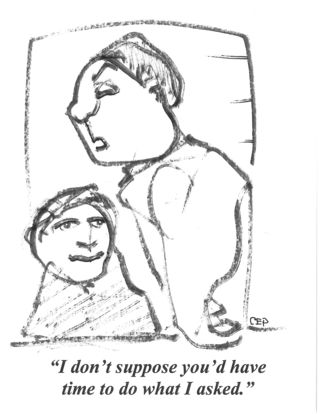
It’s pretty common, actually, although to parents this alteration in their child can come as a surprise.
I’m talking about when their bold and outgoing 10- or 11-year-old child, who was eagerly into trying everything, shows signs of shyness and anxiety about entering life situations which are unfamiliar and unstructured, acting reluctant to do so.
“She’s fine with what’s familiar, but retreats from experiences that are new and different. What’s the matter with her?”
The matter is coping with adolescent change, and she is feeling honorably ambivalent. The child part of her wants to hold on to the contentment and comforts of childhood while the restless part is urging her to let go, break some traditional boundaries , and start growing up. For a while, at the outset of this contest, the child part often seems to win. She doesn’t feel entirely ready yet, and that’s okay. Adolescence needs permission to proceed at its own individual rate, so parents need to be patient, encouraging but not critical.
Most any kind of change can be scary because to some degree it is an entry into the unfamiliar and unknown. Fear from ignorance and feeling scared of the unexpected are normal as adolescence gets underway. Fortunately, both sources of anxiety can also encourage engagement at this age.
The other side of fear is fascination, arousing curiosity. And the other side of feeling frightened is stimulation, arousing excitement. The roller coaster ride looks really scary, but is hugely tempting to try.
What generally gets the reluctant-to-grow adolescent underway is the influence of peers. Collective motivation in a peer group can persuade an individual member to go along and act accordingly. What the young person would not do by themselves on their own, she or he is more likely to do in the company of friends. So the 6th grade boy who does not want to go to his first “grown up” school dance lets himself be dragged along because he doesn’t want to be left out and miss out on the company of friends. And so the 7th grade girl, who is reluctant to dress more young womanly as puberty changes her body, agrees to let friends make her up because now they are starting to wear make-up too, and she wants to fit in.
In most cases, I think parents don’t credit the many small ways that early adolescence is scary for their daughter or son. Partly this is because of the parents’ own amnesia about anxieties of their own growing up, and partly this is because the young person keeps their fears to themselves. When parents do have the gift of recall, sharing growth anxieties from their youth can give acceptance to the young person and may encourage the daughter or son to emotionally share.
“I don’t know if my experience is exactly like yours right now, but I can definitely remember a lot of the fears I had at your age. For example, in early middle school I can remember taking hours to get my appearance and dress just right before leaving the house because I was afraid of what other people might think of how I looked. I can remember being scared of a teacher calling on me in class for fear I’d say something stupid in front of other students. I can remember being afraid of making and admitting a mistake for fear of being laughed at, or criticized, or corrected. I can remember the agony of deciding whether to try out for a team for fear of failing to make the competition . I can remember feeling scared of going along and not going along with what friends were daring to do. I can remember being afraid of trying new things because that felt like being out of control. And I had lots of other fears. But as I got used to all the changes, I grew more sure of myself and less afraid. I believe the same will be true for you. I just hope you’ll tell me when life gets scary so at least I can give you a listen. That way you won’t have to feel alone.”
It can also sometimes help if parents will talk operationally about adolescent change in terms the young person can relate to. “Growing up a big deal because it means changing in at least four ways. You have to START acting older, you have to STOP acting younger, you have to INCREASE responsibilities, and you have to DECREASE comforts you were used to. So if you’re feeling overwhelmed some times, wishing you could go back to simpler days, maybe this is why.”
In addition, parents can also soften change by explaining how it’s not as dramatic and extreme as it may first appear. “I know it feels like your whole world is being turned upside down by all this change, but it’s less than it seems. True, growing up is about you becoming DIFFERENT, but that’s actually the lesser part of the story. In fact, growing up is more about continuation than change. More about you will stay the SAME – like the person you basically are and the family you will always be part of. Growing up is about redefinition, not replacement.”
Another way to help soften early adolescent change for the young person is letting them know that she or he can hold on to childhood activities and objects and enjoyments as long as they want. “Just because you're growing older doesn’t mean you have to set aside or throw away all your precious childhood things.” This parental permission can be powerfully reassuring to a young person who is letting go of childhood but really misses holding on to some anchoring objects and activities in her former life for a while longer.

The entry into adolescence can feel daunting. However, instead of running from the feeling, the young person has to be brave. They have to follow their fear to engage with what is frightening.There is no other way. So parents can explain to the 5th grader anxious about middle school ahead: "Scary at first becomes comfortable with practice and learning. Courage to try builds confidence this way."
For more about parenting adolescents, see my book, “SURVIVING YOUR CHILD’S ADOLESCENCE,” (Wiley, 2013.) Information at: www.carlpickhardt.com
Next week’s entry: Last Stage Adolescence (18-23) and what is Consensual Sex

Carl Pickhardt Ph.D. is a psychologist in private counseling and public lecturing practice in Austin, Texas. His latest book is Holding On While Letting Go: Parenting Your Child Through the Four Freedoms of Adolescence.
- Find a Therapist
- Find a Treatment Center
- Find a Psychiatrist
- Find a Support Group
- Find Online Therapy
- United States
- Brooklyn, NY
- Chicago, IL
- Houston, TX
- Los Angeles, CA
- New York, NY
- Portland, OR
- San Diego, CA
- San Francisco, CA
- Seattle, WA
- Washington, DC
- Asperger's
- Bipolar Disorder
- Chronic Pain
- Eating Disorders
- Passive Aggression
- Personality
- Goal Setting
- Positive Psychology
- Stopping Smoking
- Low Sexual Desire
- Relationships
- Child Development
- Self Tests NEW
- Therapy Center
- Diagnosis Dictionary
- Types of Therapy

Sticking up for yourself is no easy task. But there are concrete skills you can use to hone your assertiveness and advocate for yourself.
- Emotional Intelligence
- Gaslighting
- Affective Forecasting
- Neuroscience

COMMENTS
This fear is exacerbated by the fact that it feels like people aren't accepting me now. I'm also scared of growing up because I fear it will make me "not fun anymore." I want to be fun. I remember that I've always had the childhood fear of being rejected. This is apparently a common fear, but every person - you and I - experiences ...
Withdrawing from friends and family. Excess fatigue, changes in appetite, and changes in sleep. Avoiding people, places, or situations due to feelings of anxiety or fear. If you are experiencing such symptoms, it is important to talk to a doctor or mental health professional about how you are feeling.
There are five major aspects to the fear of growing up: Symbolic separation from parents and other individuals who have offered some sense of security. This occurs as we mature, form a new and ...
Despite this being a typical trend, there is still another group of teens. It is comprised of those who are anxious about all these impending changes. Many teens are frightened by the prospect of ...
A fear of growing up — also known as "adulting anxiety" or "adult-onset anxiety" — can be characterized by an inability or unwillingness to take on adult responsibilities and a tendency to resist the transition into adulthood. While the fear of adulting is not officially recognized as a diagnosable mental health condition, it can have a ...
I believe in the fear of growing up. From grade school to middle school, it seemed like a huge step for me 3 years ago. I remember I was deathly afraid of growing up. I would always beg to God to let me stay, as I am, a happy little 5th grader. Of course my wishes were far from being granted.
Loving in the War Years is one of few that do this for me. Words like "wow" cannot do it justice. What a woman. What a talent. The fear in the language, the fearlessness in the language, the loud activism—it's suffocating and all-consuming. Loving in the War Years is genre-bending, multilayered, multiethnic brilliance.
1. Prepare for your future. Like I mentioned earlier, the unknown can be scary. That doesn't have to be a bad thing, but there are ways to limit how much "unknown" you have to deal with. The more familiar you are with the possibilities of your future, the closer you will be to conquering your adulting anxiety.
The answer is because the early adolescent knows he now has more freedom of choice than is good for him, knows that they can't actually force him or stop him, knows that he needs them to make a ...
This generation will never know the true freedom — and neglect — of being an '80s kid. By Danielle Henderson. The author and her brother excitedly prepare to spend an entire day riding their bikes in the middle of the street. Photo: Courtesy of Danielle Henderson. My 7-year-old goddaughter missed her friends a lot over the past year.
Learning to cope. Shutterstock. We found that the pivotal age for childhood worries was 10 years. This was when mothers reported their children worried most often and had a low ability to control ...
The North Wind is an independent student publication serving the Northern Michigan University community. It is partially funded by the Student Activity Fee. The North Wind digital paper is published daily during the fall and winter semesters except on university holidays and during exam weeks. The North Wind Board of Directors is composed of ...
5. Be there. I cannot stress the importance of this last tip: let your child know that they can come to you anytime, anywhere, whatever they need. Listen to them. Empathize with how they feel. Just be there. Don't let fear cripple you from being the best parent you can be. Face your anxieties head-on and take concrete steps to overcome them ...
It's responsibility and sacrifice and this panicky feeling in your stomach that you're behind everyone else your age. But it's also amazing. It just might not be what we envisioned. Being scared to grow up is natural. Every day, you're diving into uncharted territory. Every year, you're changing and evolving and taking on new challenges.
The Real Reason Young Adults Seem Slow to 'Grow Up'. It's not a new developmental stage; it's the economy. By Nancy E. Hill and Alexis Redding. Adam Maida / The Atlantic / Getty. April 28 ...
Make food preparation a pleasure rather than an obligation and you'll be amazed at how much happier you feel. The more you practice doing adult things, the less your fear of adulting will affect you, until one day it will be gone. 4. Learn to shift direction on the fly.
Peter's fear of growing up is also evinced in his allusions to growing old and eventually dying as opposed to his life in Never Land where he can remain young. Peter's meeting with Mrs. Darling ...
Growing Up Scared Spurred on by family instability, violent crime now touches millions of young lives. The control of crime in the streets, in the schools, and in the home ought to be the pre ...
Embrace and overcome your fear by putting words down. Start writing, have patience with yourself, and worry about the rest later. The blank page becomes way less scary as soon as you put words on it. 2. Stop procrastinating. Your house is already clean enough. That TV show can wait.
Suicide in the United States among adolescents aged 13-19 was the second leading cause of death in 2018. The number of suicides for males was 2,149, with a rate of 14.31 per 100,00 population; the ...
In this section, we will talk more about how to write an essay on the topic. Pick a style. There are two main essay types used for growing up papers: reflective and narrative. Both types require a narrator, a clear structure, and a purpose. Reflective essays focus on the author's attitude towards individual experiences.
The proof is in the pudding, and that pudding is TikTok. The kids are too shy to take it all in.One user recreates what it's like to side-eye the window from an aisle seat, refusing to reveal ...
The president's mental decline was like a dark family secret for many elite supporters, writes Washington correspondent Olivia Nuzzi.
It's true that the trajectory of aging varies from person to person. Biden is 81, and former President Donald Trump is 78. Both have already lived longer than the average American male lifespan ...
Fireworks were a huge part of my '4 th of July Baby' identity . Growing up, it's not an overstatement to say no one loved going to see July 4 fireworks more than I did.
Beijing and Moscow have teamed up to fly joint patrols, including a 2023 incident where they flew near South Korean airspace. Equally important is that China has become a key enabler of Russia's ...
Fear from ignorance and feeling scared of the unexpected are normal as adolescence gets underway. Fortunately, both sources of anxiety can also encourage engagement at this age. The other side of ...
Vice President Kamala Harris would be President Joe Biden's natural successor if he bowed to growing pressure and stepped aside as the Democratic candidate in the 2024 election, top Democrats say.
President Biden's shaky, halting debate performance has Democrats talking about replacing him on the ticket.
The Daily is made by Rachel Quester, Lynsea Garrison, Clare Toeniskoetter, Paige Cowett, Michael Simon Johnson, Brad Fisher, Chris Wood, Jessica Cheung, Stella Tan ...